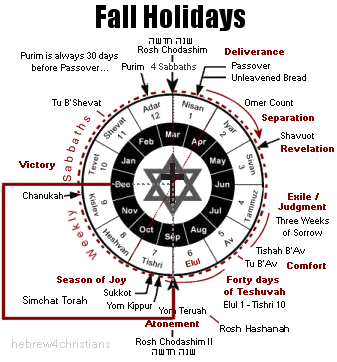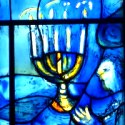|
Jewish Holiday Calendar
Note: For November 2014 site updates, please scroll past this entry....
The Jewish civil year begins in the fall, though the Biblical year begins in spring (Exod. 12:2). Preparations for the fall holidays begin with a thirty day period of teshuvah (repentance) during the (late summer) month of Elul. The following ten days begin with the Feast of Trumpets (i.e., Rosh Hashanah, on Tishri 1) and end with the Day of Atonement (i.e., Yom Kippur, on Tishri 10). These first ten days of the new year are called the "Ten Days of Awe" (i.e., aseret ye'mei teshuvah: עֲשֶׁרֶת יְמֵי תְּשׁוּבָה), or simply the Jewish "High Holidays." Just five days after the solemn time of Yom Kippur begins the joyous week-long festival of Sukkot ("Tabernacles"), which is immediately followed by the celebration of Simchat Torah.
The Fall Holidays:

The fall festivals prophetically indicate the Day of the LORD, the second coming of Yeshua, the great national turning of the Jewish people, and the establishment of the reign of the Messiah upon the earth during the Millennial Kingdom in the world to come.
Note that in accordance with tradition, the following holiday dates begin at sundown:
- Month of Elul (begins Mon., Aug. 25th, 2014)
- Month of Tishri (begins Wed., Sept. 24th, 2014)
- Month of Cheshvan (begins Thurs., Oct. 23rd, 2014)
- Month of Kislev (begins Sat., Nov. 22nd, 2014)
- Four Sabbaths: Vayetzei, Vayishlach, Vayeshev, Miketz
- Sigd - 50th day after Yom Kippur; (Tues., Nov. 29th)
- Dates for Chanukah 2014:
- 1st candle Tues., Dec. 16th [Kislev 25]
- 2nd candle Wed., Dec. 17th
- 3rd candle: Thurs., Dec. 18th
- 4th candle: Fri., Dec. 19th [Shabbat Miketz]
- 5th candle: Sat., Dec. 20th
- 6th candle: Sun., Dec. 21st
- Month of Tevet (Sun., Dec. 21st)
- 7th candle: Mon., Dec. 22nd (Tevet 1)
- 8th candle: Tues., Dec. 23rd [Zot Chanukah]
- Christmas: Thur. Dec. 25th (Tevet 3)
- Secular New Year (Tevet 10; Thur. Jan. 1st)
- Tenth of Tevet - Fast over seige of Jerusalem (Tevet 10; Thur. Jan. 1)
November 2014 Updates
Parashat Vayishlach...

[ The following entry is related to this week's Torah reading, parashat Vayishlach... ]
11.30.14 (Kislev 8, 5775) Our Torah portion this week contains the famous account of how Jacob "wrestled" with the Angel of the LORD just before he encountered his estranged brother Esau. During the "grappling" session (recall the meaning of Jacob's name), the Angel injured Jacob's thigh, but Jacob refused to release his hold until he received the blessing (הַבְּרָכָה). The LORD then asked him, "What is your name (מַה־שְּׁמֶךָ)?" And he said, "Jacob" (i.e., Ya'akov: יַעֲקב). The Angel then replied, "Your name shall no longer be Ya'akov ("heel holder" [of Esau]) but Yisrael ("contender with God"), for as a prince (i.e., sar: שַׂר) you have contended (i.e., sarita: שָׂרִיתָ) with God and with men and have prevailed" (Gen. 32:28). Jacob finally prevailed with God when he refused to let his past determine his spiritual status and destiny... He overcome the pain and shame of his past through faith...
Similarly, each of us must "go to Peniel" to wrestle with the Angel; each of us must be renamed from Ya'akov ("a supplanter") to Israel ("a prince with God"). When the Spirit of Truth asks, "What is your name," may the LORD God grant you the courage to refuse to "let go" until you receive the divine blessing of love and acceptance...
For more information, please read the Torah summary page for Vayishlach. You can also download the Shabbat "Table Talk" for the portion here:
Note: We always read this portion of Scripture a couple weeks before Chanukah when we connect the vision and ministry of Joseph with that of Yeshua, the great Suffering Servant Savior of the world. יֵשׁוּעַ אוֹר הָעוֹלָם
Gratitude and God's Nearness...
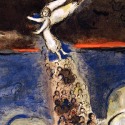
11.28.14 (Kislev 6, 5775) It is written in our Scriptures: "We give thanks to You, O God; we give thanks, for Your Name is near. We recount your wondrous deeds" (Psalm 75:1). Yes, we give thanks to God because He has graciously given us salvation (יְשׁוּעָה) through His Son Yeshua: for His Name is near. Note that the adverb "near" (i.e., karov: קָרְבָּן) means "close enough to touch," and indeed the noun form means "a near kinsman" (i.e., kinsman redeemer). Because of Yeshua, God Himself has become our "close relative." Confession (i.e., todah: תּוֹדָה) and trust (i.e., emunah: אֱמוּנָה) are central here. As it is written: "The word is very near you [כִּי־קָרוֹב אֵלֶיךָ הַדָּבָר מְאד] - as close as your mouth and your heart (Deut. 30:14). You must confess with your mouth and believe "in your heart" that God loves you with an "everlasting love." Whoever calls upon the Name of the LORD will not be disappointed (Joel 2:32; Acts 2:21; Rom. 10:9-13; Psalms 86:5; Rev. 3:20).
הוֹדִינוּ לְּךָ אֱלהִים הוֹדִינוּ וְקָרוֹב שְׁמֶךָ
סִפְּרוּ נִפְלְאוֹתֶיךָ׃
ho·di·nu · le·kha · E·lo·him · ho·di·nu · ve·ka·rov · she·me·kha,
sip·pe·ru · ni·fle·o·te·kha

"We give thanks to You, O God; we give thanks, for Your Name is near.
We recount your wondrous deeds."
(Psalm 75:1)

Download Study Card
Finding Perfect Peace...

11.27.14 (Kislev 5, 5775) Fear (and it's offspring, anger) create a sense of exile within the heart. As we focus on the LORD and spiritual reality, there is no fear, since God's light and love overcome all our darkness (John 1:5; 1 John 4:18; 5:3). The Spirit of God calls out: "Fear not, for I have redeemed you; I have called you by name, and you are mine" (Isa. 43:1). God has personally redeemed you, friend; He calls you by name, and you belong to Him. The Lord loves you with an everlasting love and draws you close (Jer. 31:3). He will never leave nor forsake you, even if you might face waters that seem to overwhelm or fires that seem to devour (Isa. 43:2). The LORD will keep you in "perfect peace" - the "peace of Peace" (שָׁלוֹם שָׁלוֹם), when you set your mind on Him (Isa. 26:3).
יֵצֶר סָמוּךְ תִּצּר שָׁלוֹם שָׁלוֹם כִּי בְךָ בָּטוּחַ
בִּטְחוּ בַיהוָה עֲדֵי־עַד כִּי בְּיָהּ יְהוָה צוּר עוֹלָמִים
ye·tzer · sa·mukh · titz·tzor · sha·lom · sha·lom · ki · ve·kha · ba·tu·ach
bit·chu · vadonai · a·di-ad · ki · be·Yah · Adonai · tzur · o·la·mim

You will keep him in perfect peace whose mind is stayed on you, for he trusts in you.
Trust in the LORD forever, for Yah the LORD is an everlasting rock.
(Isa. 26:3-4)

Hebrew Study Card
When we forget that God is in complete control of all things, we tend to grow anxious... Feeling worried comes from focusing on ourselves, a perspective that can make us feel alone, forgotten, and even victimized in this world. Worry moves us to defend ourselves, to seek refuge in our own devices, and to forfeit the will of God according to the dictates of lesser fears... The sages say it is not permitted to worry: "To worry is a sin; only one sort of worry is permissible; to worry because one worries." We should worry that we worry because this indicates our hardness of heart and our unbelief! God's name YHVH (יהוה) means "Presence," "Breath," "Life," and "Love." So why be anxious for "tomorrow"? We really only have this moment, but this moment is entirely sufficient when we walk in the light of God and seek to know him in all our ways. "Let the peace of God rule in you" (Col. 3:15).
A Grateful Heart...
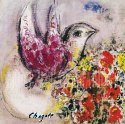
11.27.14 (Kislev 5, 5775) In Jewish thinking, we "bless" God by offering our thanks, and thereby our awareness of life is elevated and sanctified. The Hebrew term for gratitude is hakarat tovah (הַכָּרַת טוֹבָה), a phrase that means "recognizing the good." The heart looks through the eye, and therefore how we choose to see is a spiritual decision: "If your eye is "single" (i.e., ἁπλοῦς, sincere, focused)," Yeshua said, "your whole body will be filled with light" (Matt. 6:22). When we see rightly, we behold the radiance of God shining within us, even in the midst of our everyday affairs. A grateful heart is awake to God's Presence in the little things of life, those small miracles and glories that constantly surround us. The good eye of faith sees countless reasons to bless God for the precious gift of life every day...
בָּרֲכִי נַפְשִׁי אֶת־יְהוָה
וְכָל־קְרָבַי אֶת־שֵׁם קָדְשׁוֹ
ba·ra·khi · naf·shi · et · Adonai
ve·khol · ke·ra·vai · et · shem · kod·sho

"Bless the LORD, O my soul,
and all that is within me, bless his holy name"
(Psalm 103:1)

Hebrew Study Card
A Future of Hope...

11.26.14 (Kislev 4, 5775) It's been said that the will of God will never lead us to a place where the love of God will not keep us.... Indeed the very Name of the LORD (יהוה) means "Presence" (Exod. 3:14) and "Compassion" (Exod. 34:6-7). Yeshua said, "I go to prepare a place for you," which means that his love and presence are waiting for you in whatever lies ahead. Heed the message of the Holy Spirit: "For I know the plans I have for you, declares the LORD, plans for healing and not for evil, to give you a future and a hope (Jer. 29:11).
כִּי אָנכִי יָדַעְתִּי אֶת־הַמַּחֲשָׁבת
אֲשֶׁר אָנכִי חשֵׁב עֲלֵיכֶם נְאֻם־יְהוָה
מַחְשְׁבוֹת שָׁלוֹם וְלא לְרָעָה
לָתֵת לָכֶם אַחֲרִית וְתִקְוָה
ki · a·no·khi · ya·da·ti · et · ha·ma·cha·sha·vot
a·sher · a·no·khi · cho·shev · a·lei·khem · ne·um · Adonai
mach·she·vot · sha·lom · ve·lo · le·ra·ah
la·teit · la·khem · a·cha·rit · ve·tik·vah

"For I know the thoughts I have for you, declares the LORD,
thoughts for healing and not for evil, to give you a future and a hope."
(Jer. 29:11)

Hebrew Study Card
The message of the cross is that our lives matter to God. We are "am segulah," a treasured people, called to walk in the zeal of God's love (1 Pet. 2:9; Titus 2:4). Your life has great value; you are significant and you are truly loved by our Heavenly Father. There is a "future and a hope" reserved for you (Jer. 29:11); there is "a white stone, and on that stone will be written a new name that no one can understand except the one who receives it" (Rev. 2:17). May you trust in the Lord be'khol levavkha, with all your heart... Amen.
Thanksgiving and Sukkot...

11.25.14 (Kislev 3, 5775) The American holiday of Thanksgiving (חַג הַהוֹדָיָה) certainly has its roots in the Jewish tradition of giving thanks to God, and some historians believe that the early "pilgrims" derived the idea for the holiday from the Biblical festival of Sukkot (i.e., "the feast of Tabernacles"). Before coming to the New World, the pilgrims lived for a decade among the Sephardic Jews in Holland, since Holland was considered a safe haven from religious persecution at the time. Since the pilgrims were devout Calvinists and Puritans, their religious idealism led them to regard themselves as "new Israel," and it is likely that they learned that Sukkot commemorated the people of Israel's deliverance from their religious persecution in ancient Egypt at that time. After they emigrated to the "Promised Land" of America, it is not surprising that these pilgrims may have chosen the festival of Sukkot as the paradigm for their own celebration. As the Torah commands: "Celebrate the feast so that your generations may know that I made the people of Israel dwell in booths when I brought them out of the land of Egypt: I am the LORD your God" (Lev. 23:39-43). The highly devout pilgrims regarded their perilous journey to the new world as a type of "Exodus event" and therefore sought the appropriate Biblical holiday to commemorate their safe arrival in a land full of new promise...
It is interesting to note that the Hebrew word for "turkey" is tarnegol hodu (תַּרְנְגוֹל הוֹדו), literally, "Indian chicken," which is often shortened to hodu (הוֹדוּ). It is a happy coincidence that we customarily eat turkey on Thanksgiving, and this reminds us of the "thanks" connection: "Give thanks (hodu) to the Lord for he is good" (הוֹדוּ לַיהוָה כִּי־טוֹב), for His steadfast love endures forever."
הוֹדוּ לַיהוה כִּי־טוֹב כִּי לְעוֹלָם חַסְדּוֹ
ho·du la·Adonai ki tov, ki le·o·lam chas·do

"Give thanks to the LORD for He is good;
for His steadfast love endures forever."
(Psalm 136:1)

Hebrew Study Card
Note: For more on this subject, see "Thanksgiving and Sukkot."
The LORD your Guardian...
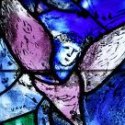
11.25.14 (Kislev 3, 5775) Where it says, "The LORD is your Guardian; the LORD is your shade at your right hand" (Psalm 121:5), note that God's Presence is likened to the shadow (צֵל) cast by someone who walks closely beside you, holding your hand (Psalm 23:4). Your "right hand" (יְמִינֶךָ) refers to your decision to "see the unseen" by performing acts of righteousness in this world: the blessing of God is then cast upon all you do (Deut. 2:7; Psalm 1:3). Neither does God "slumber or sleep," for the LORD your Guardian (יְהוָה שׁמְרֶךָ) is fully awake, full of life, insuperable power, and divine action! Our help comes from the LORD, "oseh shamayim va'aretz" (עשֵׂה שָׁמַיִם וָאָרֶץ) - the Maker of heaven and earth.
יְהוָה שׁמְרֶךָ
יְהוָה צִלְּךָ עַל־יַד יְמִינֶךָ
Adonai · shom·re·kha
Adonai · tzil·le·kha · al-yad · ye·mi·ne·kha

"The LORD is your Guardian;
the LORD is your shade on your right hand."
(Psalm 121:5)

Note: Some of the sages (e.g., Baal Shem Tov, Ramban, etc.) have said that "God is your shadow" (יְהוָה צִלְּךָ) suggests that he reflects your actions back to yourself. To one who acts with cruelty, God will show himself cruel; to one who shows compassion, God will show himself compassionate, and so on. Just as a person's shadow will follow his movements, so God will pursue the soul. This idea is of course derived from the Scriptures - "according to your faith be it done unto you" (Mark 9:29): "With the merciful you show yourself merciful; with the blameless man you show yourself blameless; with the pure you will show yourself pure; and with the perverse you will show yourself perverse" (Psalm 18:25-26). Moreover we are warned: "Do not be deceived: God is not mocked, for whatever one sows, that will he also reap" (Gal. 6:7). "Toward the scorners he is scornful, but to the humble he gives favor" (Prov. 3:34). Thankfully the "karma of reciprocity" may be overruled by God's grace, so that unmerited blessing is bestowed upon the trusting soul, despite his or her many sins (Hab. 2:4; Gal. 3:11): "He has not dealt with us according to our sins, nor repayed us according to our iniquities" (Psalm 103:10).
 |
The Ladder of Truth...
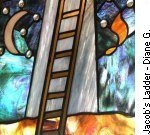
11.25.14 (Kislev 3, 5775) The Hebrew idea of "truth" (i.e., emet: אֱמֶת) is richer than the factual description, since it contains moral implications and possibilities: what is true is also right, good, reliable (honest), beautiful, and sacred. The Hebrew word comes from a verb (aman) that means to "confirm" or establish, and the noun form (i.e, emunah: אֱמוּנָה, "faithfulness" or "trustworthiness") expresses the will to live by what is ratified, the "amen" of decision. The Hebrew concept is therefore existential: truth that is not lived is not truth. Speaking the truth (dibbur emet) and abhoring dishonesty are considered foundational to moral life, as it says: "Speak the truth (דַּבְּרוּ אֱמֶת) to one another; render true and perfect justice in your gates" (Zech. 8:16). Yeshua repeatedly said, "Amen, amen I say to you...." throughout his ministry to stress the reliability and certainty of God's truth (Matt. 5:18, 26, etc.). Indeed, Yeshua is called "the Amen, the faithful and true witness" (Rev. 3:14).
The ancient Greek word translated "truth" is aletheia (ἀλήθεια), a compound formed from an alpha prefix (α-) meaning "not," and lethei (λήθη), meaning "forgetfulness." Greek scholars say the word lethei itself derives from the verb lanthano (λανθάνω), which means "to be hidden," so the general idea is that a-letheia (i.e., truth) is non-concealment, non-hiddenness, or (put positively) revelation or disclosure. Thus the word of Yeshua - His message, logos (λόγος), revelation, and presence - is both "unforgettable" and "irrepressible." Yeshua is the Unforgettable One that is manifest as the express Word of God (דְּבַר הָאֱלהִים). He is the Light of the world (אוֹר הָעוֹלָם) who imparts the "light of life" (John 8:12). Though God's message can be supressed by evil and darkened thinking, the truth is regarded as self-evident and full of intuitive validation (see Rom. 1:18-21).
Note that the LXX (i.e., the ancient Greek translation of the Torah and OT otherwise known as the Septuagint) dates from the time of the philosopher Plato, though of course the Hebrew text dates back to the time of Moses (13th century BC) and even earlier. About 300 BC, "Theophrastus," a student of Aristotle, wrote of the Jews that 'being philosophers by race, they converse with each other about the Divine." Abraham, who dates from about 2,000 BC, was the first avowed monotheist who openly repudiated the polytheism and idolatry of ancient Ugaritic culture (Abraham long predates the rise of Hinduism and the animistic hymns of the Vedas and their priestly commentary found in the Upanishads by a thousand years). Similarly, both David and his son Solomon (10th century BC) wrote "existential" works of philosophy, predating the modern world by nearly 3,000 years...
Regarding Jacob's famous dream, the sages ask: "When is the man lower on the ladder higher than the man who is higher on the ladder? When the lower one is climbing up and other higher one is descending down..." Or as Kierkegaard put it, the way is "how." How you focus determines the direction you are taking. So where is your focus? Are you looking to God for help, for strength, and the ability to draw close to him, or are you looking to your own strength, direction, and will?
 |
Jacob's Dream of Messiah...
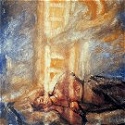
[ The following is related to this week's Torah reading, Parashat Vayetzei... ]
11.25.14 (Kislev 3, 5775) The revelation at Sinai and Jacob's vision of the ladder share something in common. Just as Yeshua was the "Voice of the Living God (קוֹל אֱלהִים חַיִּים) speaking (davar) from the midst of the fire" at Sinai (Deut. 5:26), so He was the Ascended LORD standing above the ladder speaking the word of promise (Gen. 28:12-15). In this connection we note that the words for "ladder," (i.e., sullam: סֻלָּם), "voice" (i.e., kol: קל), and "Sinai" (סִינָי) have the same numerical value, which suggests a connection between the two great visions. Yeshua is the Ladder to God, the means by which the Living Torah both descends and ascends for the sake of our deliverance (John 1:51). The "ladder of Sinai" is not meant for us to ascend but rather is for the LORD our Savior to descend and ascend on our behalf. This is always the way of the Righteousness of God rather than the religious aspiratoins of man... Yeshua is the way, the truth, and the life (הדֶּרֶךְ וְהָאֱמֶת וְהַחַיִּים): no one can draw near to the Heavenly Father apart from Him (John 14:6).
Note: For more on this subject, see "Jacob's Dream of Messiah."
 |
A Deeper Awakening...
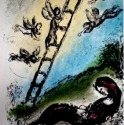
[ The following is related to this week's Torah reading, parashat Vayetzei... ]
11.24.14 (Kislev 2, 5775) From our Torah this week we read: "Then Jacob awoke from his sleep and said, "Surely the LORD is in this place (אָכֵן יֵשׁ יְהוָה בַּמָּקוֹם הַזֶּה), yet I did not know it" (Gen. 28:16). This event marked a deeper awakening for Jacob as he discovered God's Presence even in his sleep, even while in exile, and even in his ignorance... Henceforth Jacob began to understand that the whole world is filled with God's glory (Isa. 6:3), and that Torah is centered on knowing Him in all our ways (Prov. 3:6).
בְּכָל־דְּרָכֶיךָ דָעֵהוּ
וְהוּא יְיַשֵּׁר ארְחתֶיךָ
be·khol · de·ra·khe·kha · da·ei·hu
ve·hu · ye·ya·sher · or·cho·te·kha

"In all your ways know Him
and he will make upright your paths."
(Prov. 3:6)

Jacob had been asleep but was suddenly jarred awake. He found himself in awe, sensing the presence of the gateway to heaven. The sages note the grammar here is emphatic, suggesting that Jacob said: "Surely the LORD is in this place -- but am I (וְאָנכִי)? I do not know! (לא יָדָעְתִּי). Jacob had awakened from his dream to realize that he had been dreaming his life away, living in a fantasy world. God is present in this place – but am I? Have I awakened to be present before God?
All religious reality begins with what biblical religion calls the 'fear of God.' It comes when our existence between birth and death becomes incomprehensible and uncanny, when all security is shattered through the mystery. This is not the relative mystery of that which is inaccessible only to the present state of human knowledge and is hence in principle discoverable. It is the essential mystery, the inscrutableness of which belongs to its very nature... Through this dark gate (which is only a gate and not, as some theologians believe, a dwelling) the believing man steps forth into the everyday which is henceforth hallowed as the place in which he has to live with the mystery. He steps forth directed and assigned to the concrete, contextual situations of his existence. That he henceforth accepts the situation as given him by the Giver is what Biblical religion calls the 'fear of God.' - Martin Buber, Eclipse of God
When God said, "Let there be light, and there was light" (Gen. 1:3), He seemed to put on light as a robe of the Divine Majesty and Kingship: He wrapped Himself with radiance as a tallit gadol... Da lifnei mi attah omed (דַּע לִפְנֵי מִי אַתָּה עוֹמֵד) – "Know before whom you stand." The whole earth is lit up with God's glory, and every bush of the field is aflame before us -- if we have eyes to see (Isa. 6:3). May it please the LORD to open our spiritual eyes so that we can behold more of His glory and majesty in this hour... Amen.
Personal Update: Please remember me (John) in your prayers, friends... I am beset with various challenges and difficulties and covet your prayers for God's help and blessing. Thank you so much, chaverim.
Teshuvah of Quiet...

11.24.14 (Kislev 2, 5775) "Be still and know that I AM..." (Psalm 46:10). Prayer is a type of listening (shema), a turning back to heed the message of God's love and hope. Indeed, the word "teshuvah" (תְּשׁוּבָה), often translated as "repentance," also means an answer or response to a question. God's love is the question, and the heart's response is the answer. Some of us may find it difficult to trust, to open our heart to receive grace and kindness. For those of us wounded by abandonment, it can be a great struggle to hear the voice of God calling you "beloved," "worthy," "valued," and "accepted." When you find faith to receive God's word of love, however, your heart comes alive and you begin to heal. May you hear the Spirit speaking to you this hour...
Parashat Vayetzei - וַיֵּצֵא
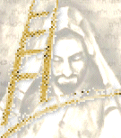
11.23.14 (Kislev 1, 5775) Our Torah portion this week (Vayetzei) includes Jacob's dream of a ladder (סֻלָּם) extending from earth to heaven, with the angels of God ascending and descending, and the LORD Himself standing above assuring Jacob of his safe return to the land he had fled. Jacob awoke and responded to the dream with awe: "Surely the LORD is in this place (בַּמָּקוֹם הַזֶּה), and I did not know it." And he was afraid and said, "How awesome is this place! This is none other than the house of God, and this is the gate of heaven." And he called the name of that place Bethel (בֵּית־אֵל) i.e., "the house of God."
The sages explain that ha-makom (הַמָּקוֹם), literally "the place" that Jacob saw, was actually Mount Moriah, the location where Jacob's father Isaac was bound as the "sacrificed seed" and which later became the site of the Holy Temple. The word makom comes from a verb (קוּם) meaning "to arise," suggesting resurrection and ascension. In later Rabbinical thought Ha-Makom became synonymous with the name of God Himself ("God is the place of the world, but the world is not God's only place").
Yeshua referred to Jacob's dream when he said, "Truly, truly, I say to you, you will see heaven opened, and the angels of God ascending and descending on the Son of Man" (John 1:51). Just as Jacob saw the ladder ascending to heaven with the angels of God ascending and descending upon it, so Yeshua told Nathanael that He was the Ladder to God, the sha'ar ha-shamayim (שַׁעַר הַשָּׁמָיִם) - the way into heaven (John 14:6). Indeed, Yeshua is the true Place or "house of God" and its Chief Cornerstone (Rosh Pinnah, Matt. 21:42). The LORD is the resurrection and life, the One who prepares a place for you (John 11:25; 14:2).
For more information, please read the Torah summary page for Vayetzei and its related articles. You can also download the "Table Talk" for the portion here:
Isaac's Troubled Family...
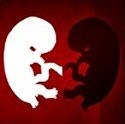
11.21.14 (Cheshvan 28, 5775) It is quite clear that the families of the patriarchs had serious struggles and were often quite "dysfunctional." If we idealize these people, however, we tend to forget their humanity, and they may appear disconnected from us - on a much higher spiritual level. The story of Isaac's troubled family is ultimately one of hope for us all. Isaac was deeply wounded but ultimately found healing, just as his son Jacob later wrestled through his family issues to be renamed "Israel." Take heart, chaverim: God can use us for His kingdom purposes despite whatever wounds and troubles might be in our family backgrounds. The Spirit speaks: "I AM the LORD your healer" (אֲנִי יְהוָה רפְאֶךָ).
Note: For more on this see, "Isaac's Troubled Family: Further thoughts on Toldot."
Shabbat shalom and thank you for helping Hebrew for Christians continue as a ministry!
Hebrew Wordplay...
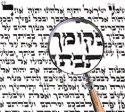
[ The following is related to this week's Torah reading, parashat Toldot... ]
11.21.14 (Cheshvan 28, 5775) The Hebrew Scriptures are filled with various kinds of wordplay. In addition to some humorous play on words (i.e., puns), you will discover alliteration, acrostics, parables, similes, metaphors, hyperboles, gematria, and other literary devices used in the Hebrew text. Many examples appear on the surface-level of the texts. For example, "Adam" (אָדָם) is a play on the word adamah (אֲדָמָה, "ground"); Chavah (חַוָּה, "Eve") is a play on the word chai (חַי, "life"); Kayin (קַיִן, "Cain") is a play on the verb kanah (קָנָה, "to get"), Yitzchak (יִצְחָק, "Isaac"), plays on the verb tzachak (צָחַק, "to laugh"), and even the name "Jesus" (i.e., Yeshua: יֵשׁוּעַ) plays on the Hebrew word for deliverance or salvation (i.e., yeshuah: יְשׁוּעָה). Of course, many other examples could be cited...
Of interest to our Torah for this week (parashat Toldot), we note that wordplay was applied to Isaac's two sons. When the twins were born, the first came out hairy and was named Esau (עֵשָׂו), perhaps from the word esev (עֵשֶׂב), "grass" or "weed" of the field), whereas the second came out with his hand on his brother's heel, and was named Ya'akov (יַעֲקב, "grappler," from the word עָקֵב, "heel"). Later, when Esau learned that Jacob had taken away his blessing, he exclaimed, "Is he not rightly named "heel holder" (i.e., יַעֲקב)? For he has taken me by the heel (יַּעְקְבֵנִי) these two times. He took away my birthright, and behold, now he has taken away my blessing" (Gen. 27:36).
For more on this subject, see "Hebrew Wordplay: Further Thoughts on Vayera."
 |
Shekhinah of Humility...
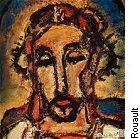
11.21.14 (Cheshvan 28, 5775) "Let your tongue acquire the habit of saying, 'I do not know,' so that you are not led to lie" (Berachot 4a). We have to learn that we don't always know the answer, and that often enough we don't even know the meaning of the question being asked... Accepting our limitations enables us to humbly ask God for help as we walk by faith. "The Spirit helps us in our weaknesses. For we do not know (οὐκ οἴδαμεν) what to pray for as we ought, but the Spirit intercedes for us with groanings too deep for words" (Rom. 8:26). We groan in hope... It is a blessedness to be free from the need to be seen, to be approved by others, to feel like we always have to be "right," to manage appearances, and so on. God opposes the proud, but his Spirit (רוּחַ) rests upon the lowly, the humble of heart. Therefore humility (עֲנָוָה) is considered one of the greatest of middot ha-lev (heart qualities). As it is written, the high and lifted up One dwells with the broken and lowly of spirit, to revive the spirit of the lowly and to revive the heart of the crushed:
כִּי כה אָמַר רָם וְנִשָּׂא שׁכֵן עַד וְקָדוֹשׁ שְׁמוֹ
מָרוֹם וְקָדוֹשׁ אֶשְׁכּוֹן וְאֶת־דַּכָּא וּשְׁפַל־רוּחַ
לְהַחֲיוֹת רוּחַ שְׁפָלִים וּלְהַחֲיוֹת לֵב נִדְכָּאִים
ki · kho · a·mar · ram · ve·nis·sa · sho·khen · ad · ve·ka·dosh · she·mo,
ma·rom · ve·ka·dosh · esh·kon · ve·et · dak·ka · ush·fal · ru·ach
le·ha·cha·yot · ru·ach · she·fa·lim · u·le·ha·cha·lot · lev · nid·ka·im

"For this is what the high and lifted up One says, the One who abides forever,
whose Name is Holy: "I dwell in a high and holy place, but also with the broken
and lowly of spirit, to revive the spirit of the lowly and to revive the heart of the crushed."
(Isa. 57:15)

Download Study Card
God reveals Himself to the "lowly in spirit" (שְׁפַל־רוּחַ), that is, to those who understand their own nothingness and complete dependence on Him.... Notice that the word dakka (דַּכָּא) refers to being crushed to the very dust, the very same word used to describe how Yeshua was crushed for our iniquities (Isa. 53:10). William James called this deep work of the spiritual life Zerrissenheit, a term that can be translated as "torn-to-pieces-hood," or a state of being utterly broken and in disarray... From the point of view of our dependence on God for salvation, dakka refers to humility and contrition we express in light of God's unmerited favor and love for our souls... We identify with the death of Messiah offered on our behalf; we find healing and acceptance in the Presence of the One who was torn to pieces and made dust for our merit. Humility is essential to awareness of God in the truth.
Note: Thank you all so much for remembering this ministry in your prayers, for without your help, I couldn't do this work. Thank you again, and may God's blessing be upon you!
 |
Rosh Chodesh Kislev...
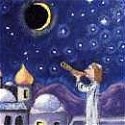
11.20.14 (Cheshvan 27, 5775) On the Biblical calendar the month of Kislev (כִּסְלֵו) is the ninth of the year (counting from Nisan), and it is also one of the "darkest" of the year, with the days progressively getting shorter and the nights getting longer. Indeed, the Winter Solstice generally occurs during the last week of Kislev, and therefore the week of Chanukah (which straddles the months of Kislev and Tevet) often contains the longest night of the year (and even during "leap years," when the solstice occurs a bit later, there is always a new moon during the season of Chanukah). It is no wonder that, among other things, Chanukah represents an appropriate time to kindle the lights of faith - and to remember the Light of the World in the Messiah's advent to earth...
יְהִי רָצוֹן מִלְּפָנֵיךָ יהוה אֱלהֵינוּ וֵאלהֵי אֲבוֹתֵינוּ
שֶׁתְּחַדֵּשׁ עָלֵינוּ חדֶשׁ טוֹב בַּאֲדנֵינוּ יֵשׁוּעַ הַמָּשִׁיחַ אָמֵן
ye·hi · ra·tzon · mil·fa·ne·kha · Adonai · E·lo·hei·nu · ve·lo·hei · a·vo·tei·nu
she·te·cha·desh · a·lei·nu · cho·desh · tov · ba'a·do·nei·nu · Ye·shu·a · ha·ma·shi·ach · A·men

"May it be Your will, LORD our God and God of our fathers,
that you renew for us a good month
in our Lord Yeshua the Messiah. Amen."
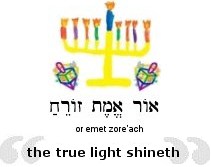
Download Study Card
This year the month of Kislev begins Saturday, November 22nd after sundown, which means that the eight-day festival of Chanukah begins on Tuesday, Decemeber 16th at sundown (1st candle) and runs through Tuesday, December 23rd. Chodesh tov, chaverim.
Bartering with Vanity...
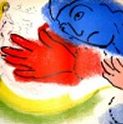
11.19.14 (Cheshvan 26, 5775) From our Torah portion (i.e., Toldot) we read: "And Esau said to Jacob, 'Let me eat some of that red stew, for I am exhausted!' Therefore his name was called Edom (אֱדוֹם)." The Hebrew text more forcefully reports Esau's words: 'Let me gulp down (הַלְעִיטֵנִי) some of that "red-red stuff" (הָאָדם הָאָדם), picturing how eagerly he bartered away the blessing of heaven for a momentary and fleeting pleasure... The Maharal of Prague said that when Esau called the stew that "red-red stuff," he was acting like an animal that relates to things without restraint, in the immediacy of the moment, and without regard to their "form," that is, their higher purposes or end...
נִבְחָר שֵׁם מֵעשֶׁר רָב
מִכֶּסֶף וּמִזָּהָב חֵן טוֹב
niv·char · shem · me'osher · rav
mi'kesef · u'mizahav ·chen · tov

"A good name is to be chosen rather than great wealth,
grace is better than silver or gold."
(Prov. 22:1)
"See to it that no one fails to obtain the grace of God; that no "root of bitterness" springs up and causes trouble, and by it many become defiled; and that no one is sexually immoral or profane (i.e., βέβηλος, worldly, ungodly) like Esau, who sold his birthright for a single meal" (Heb. 12:15-16). Surely this is the deeper meaning of "profanity" - to deny reality, to live in willful ignorance, and to miss the glory of God's presence.
Seeing with Wonder...
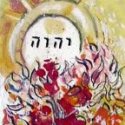
11.19.14 (Cheshvan 26, 5775) The commandment not to take the Name of the LORD "in vain" (Exod. 20:7) implies that we must affirm the sanctity, meaning, significance, and worth of life itself. We must never live as though God does not exist, or, to state this positively, we must "set the LORD" always before us (Psalm 16:8). It is therefore forbidden to ignore the miracle of existence, to scoff at the value of life, or to debase ourselves by refusing to receive the truth. We are to take every thought "captive" to the reality of the Messiah ((2 Cor. 10:5). Everything belongs to God, and every moment we have is beholden to Him...
שִׁוִּיתִי יְהוָה לְנֶגְדִּי תָמִיד
כִּי מִימִינִי בַּל־אֶמּוֹט
shi·vi·ti · Adonai · le·neg·di · ta·mid
ki · mi·mi·ni · bal · e·mot

"I have set the LORD always before me;
because he is at my right hand, I shall not be shaken."
(Psalm 16:8)

Hebrew Study Card
"We destroy arguments and every lofty opinion raised against the knowledge of God, and take every thought captive to obey Messiah" (2 Cor. 5:10). We are instructed to "bring down reasonings" (λογισμοὺς καθαιροῦντες) and every high thing that is lifted up against the knowledge of God (κατὰ τῆς γνώσεως τοῦ θεου) and to bring every thought "as a captive" to the obedience (ὑπακοὴν, from ὑπό: by, under, + ἀκούω: hear, obey) of Messiah. We can do this negatively by fighting against evil thoughts and censoring the inner evil of our hearts, or we can do this positively by being "captivated" by the words and love of Yeshua, and often we have to do both! This is the deeper meaning of "profanity" - to deny reality, to live in willful ignorance, and to miss the wonder of God's presence. If we sanctify God in our hearts, we will be far less likely to use God's name in vain, of course.
God invites you to come to Him for relationship... Since God is a Person, He wants to know you as a person. He is not interested in formulaic prayers, religious rituals, or your membership at a particular religious organization. God wants to know your inmost thoughts and heart. Drawing near to God is God's way of drawing near to you... In other words, as you draw near to God, He will draw near and touch you. (more here)
 |
Two Blessings for Jacob...
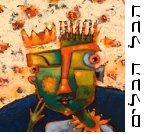
[ The following is related to this week's Torah reading, parashat Toldot... ]
11.19.14 (Cheshvan 26, 5775) When we think of Jacob as a young man, we naturally tend to recall the dramatic episode when he surreptitiously disguised himself as Esau to "steal" the blessing from his father Isaac. In this week's Torah reading, however, we discover that Jacob actually received two blessings from his father. The first blessing -- given to a disguised Jacob -- focused on material blessings: the "dew of heaven," the "fatness of the earth," "plenty of grain and wine," political power and hegemony (Gen. 27:28-29), whereas the second blessing -- given to an undisguised Jacob -- focused on his role as God's chosen patriarch of Israel (Gen. 28:3-4). The difference between these blessings turned on Isaac's restored vision. His first blessing was tailored to the character of Esau as his "natural choice," whereas his second blessing looked beyond mere appearances to behold the vision that was originally given to his father Abraham:
וְאֵל שַׁדַּי יְבָרֵךְ אתְךָ
וְיַפְרְךָ וְיַרְבֶּךָ וְהָיִיתָ לִקְהַל עַמִּים
וְיִתֶּן־לְךָ אֶת־בִּרְכַּת אַבְרָהָם
לְךָ וּלְזַרְעֲךָ אִתָּךְ
ve'el · Shad·dai · ye·va·rekh · ot·kha
ve'yaf·re·kha · ve'yar·be·kha · ve'ha·yi·ta · lik·hal · a·mim
ve'yit·ten · le·kha · et · bir·kat · Avraham
le·kha · ul·zar·a·kha · i·takh

"May El Shaddai bless you,
make you fertile and numerous to become an assembly of peoples.
And may He grant the blessing of Abraham
to you and your offspring"
(Gen. 28:3-4)

- Isaac's second blessing to Jacob
In a sense, the self-effacing, disciplined, and strong-willed Isaac abandoned his "natural vision" (i.e., to install Esau as the next patriarch, despite the assumed remonstration of his wife Rebekah) by finally surrendering to the vision of his father Abraham. Isaac's entire life was a sort of overreaction to his father - an "antithesis to Abraham's thesis." By choosing to bless Jacob a second time, this time with his eyes wide open, Isaac revealed that he had finally accepted the grace of God that was revealed to his father Abraham.
Recall that after Esau discovered that the blessing was given to Jacob, he lamented and pleaded with his father to bestow upon him a blessing as well. It is interesting to note that the "residual" blessing that Isaac gave to Esau was the inverse of that given to Jacob: the "fatness of the earth" was put before the "dew of heaven" (compare Gen. 27:39 with Gen. 27:28). Receiving sustenance from heaven is of greater value than finding earthly prosperity. And indeed, Jacob was "blessed" with trouble his whole life, which caused him to rely on the "dew from heaven," whereas Esau was "blessed" with prosperity that came from trafficking in this world.
Note: The metaphors the "dew of the heavens" and the "fatness of the earth" suggest focus, the former alluding to spiritual blessing and the latter to worldly good... Hence Jacob was later vexed and sent into exile, whereas Esau inhabited Mount Seir and embedded himself in the land. Isaac's first blessing (to a disguised Jacob), does not contradict this comment, since Isaac was speaking prophetically about Jacob and Esau, and only later did he reaffirm the prophecy by bestowing upon Jacob the blessing of his father Abraham...
 |
Pouring out of Heart...

11.18.14 (Cheshvan 25, 5775) A pious man once complained to the Kotzer Rebbe that it was difficult for him to earn a living. The rebbe counseled him to pray to God to have mercy upon him. The man replied that he didn't think his prayer would avail with the Almighty. The rebbe then said, 'If that is your feeling, then you have a much greater problem than lack of livelihood! You should be more upset that you do not know how to pour your heart out before God!" Indeed our Scriptures teach us to come "boldly" before the Throne of Grace (παρρησίας τῷ θρόνῳ τῆς χάριτος) that we may receive mercy (רַחֲמִים) and find grace (חֶסֶד) to help in time of need" (Heb. 4:16). Note that the Greek word translated "boldly" in this verse (παρρησίας) comes from πᾶς (all) + ῥέω (to utter), suggesting that we can speak freely to God and share everything within our heart without fear or shame.
בִּטְחוּ בוֹ בְכָל־עֵת עָם
שִׁפְכוּ־לְפָנָיו לְבַבְכֶם
אֱלהִים מַחֲסֶה־לָּנוּ סֶלָה
bit·chu · vo · ve·khol-et · am
shif·khu · le·fa·nav · le·vav·khem
E·lo·him · ma·cha·seh-la·nu · se·lah

"Trust in him at all times, O people;
pour out your heart before him;
God is a refuge for us. Selah."
(Psalm 62:8)

Pouring out your heart to God in an honest, transparent, and earnest way is sometimes called hitbodedut (הִתְבּוֹדְדוּת). After we "talk our hearts out" before the Lord, in our emptiness we can begin to truly listen, as it says, "In returning and rest you shall be saved; in quietness and in trust shall be your strength" (Isa. 30:15). Only after we sigh deeply and surrender are we receptive to the voice of the Spirit's whisper. "Blessed are all those who wait for Him" (Isa. 30:18). We wait, we abide, even when God takes his time or does not immediately intervene. We do not lose heart, for we find strength when we trust in God's love... The Light of the world still shines: Yeshua, be my inner word, my heart, and my groaning for life today, and forevermore, amen.
Remember the One who poured out his heart for our healing before the Father, in the agony of his passion and in his heart's suffering unto death for our sake... Few words were spoken, but groans, cries, gasps for breath, and the steadfast resolution to offer up the last drop of his blood for our healing and life... Pouring out of heart is not about the words we use, but the fullness of heart being presented: "When you pray, rather let thy heart be without words than thy words be without heart" (Bunyan).
 |
Barrenness and Prayer...
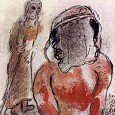
11.18.14 (Cheshvan 25, 5775) Our Torah portion this week (Toldot) explains that Isaac and Rebekah were still childless after 20 years of marriage. "And Isaac prayed to the LORD for his wife, because she was barren" (Gen. 25:21). The midrash (בראשית רבה) on this verse says that the patriarchs and matriarchs (Sarah, Rebekah, Rachel) were childless for so long because God wanted them to stretch their hearts in earnest prayer... The commentator Rashi says the Hebrew word for "prayer," tefillah (תְּפִלָּה), implies bonding, communion, and cleaving to God, and the times of barrenness were meant to draw the heart closer to God for help... We may know some things of Torah; we may suppose we understand truth from Scripture, but prayer from the heart unites us to the LORD our God. "Teach me your way, O LORD, and I will walk in your truth; unite my heart to fear your Name" (Psalm 86:11).
הוֹרֵנִי יְהוָה דַּרְכֶּךָ אֲהַלֵּךְ בַּאֲמִתֶּךָ
יַחֵד לְבָבִי לְיִרְאָה שְׁמֶךָ
ho·re·ni · Adonai · dar·ke·kha · a·ha·lekh · ba·a·mi·te·kha
ya·ched · le·va·vi · le·yir·ah · she·me·kha

"Teach me your way, O LORD, and I will walk in your truth;
unite my heart to fear your Name."
(Psalm 86:11)

Download Study Card
Note: For more on this subject, see "Barrenness and Prayer."
Blessings and Bean Soup...

[ The following is related to this week's Torah reading, parashat Toldot... ]
11.18.14 (Cheshvan 25, 5775) From our Torah this week (Toldot) we read: "Then Jacob gave Esau bread and lentil stew (לֶחֶם וּנְזִיד), and he ate and drank and rose and went his way. Thus Esau despised (בָּזָה) his birthright (בְּכרָה)" (Gen. 25:34). Esau esteemed the honor of being the firstborn son (i.e, bechor: בְּכוֹר) – the high priest of the family – as worth a "bowl of beans" when compared with the drive of his lower nature, and so he tragically forfeited the blessing of God... Far from regarding service to God as a divine privilege and wonderful opportunity, Esau wanted to be free of such responsibilities and therefore discredited the meaning and promise of faith. Note that the Hebrew word for "lentil stew" (or pottage) is nazid (נָזִיד), which comes from a Hebrew word that means "to boil up" in pride (i.e., zid: זִיד). Sadly, Esau was consumed with his own interests and regarded them as more important than the things of God.
Note: "Then Jacob gave Esau bread and lentil stew, and he ate and drank and rose and went his way. Thus Esau despised his birthright" (Gen. 25:34). Most translations of the Hebrew text suggest that because he bartered his birthright Esau disparaged it, but the text also implies continuity: after he ate, drank, and went his way, then Esau rationalized his bad decision by denying its importance...
 |
The Oath of Blessing...
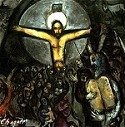
[ The following is related to this week's Torah reading, parashat Toldot... ]
11.17.14 (Cheshvan 24, 5775) In our Torah for this week (Toldot) we learn that the great oath of blessing that God gave to Abraham was extended (exclusively) to his beloved son Isaac (Gen 26:3-4; Rom. 9:7). Recall that it was only after the Akedah (the sacrifice of Isaac) that the LORD God swore the oath (שְׁבוּעָה) that through Abraham would all the families of the earth be blessed: "By myself I have sworn, declares the LORD, because you have done this and have not withheld your son, your only son (ben yachid), I will surely bless you... and in your offspring shall all the nations of the earth be blessed, because you have obeyed my voice" (Gen. 22:16-18; cp. Gal. 3:9,16). The phrase, "by myself have I sworn" is the most solemn oath God could make and must be regarded as an inviolable vow (Heb. 6:13-18). It is nothing short of astounding to realize that the very existence of Israel and the Jewish people - and therefore the advent of the Messiah himself - derives from the Abraham's willingness to sacrifice his "only begotten son," an act of faith that constituted a "deeper Torah" than the law of Moses that was given at Sinai...
The "Gospel of Moses" revealed in the Akedah foretells the cross of our Savior. For more on this subject, see "Israel and the Akedah" here.
 |
God's Word of Love...

11.17.14 (Cheshvan 24, 5775) In moments of testing, and especially in your failures, heed the voice of God's compassion (מילות רחומות). Use the "good eye" (עַיִן טוֹבָה) to see how the Spirit draws you close in your weakness, gently urging you to return from your self-imposed exile, and welcoming you back to the Divine Presence. Note that the good eye (ayin tovah) is also called the "beautiful eye" (עין יפה), since it sees beauty even in ashes... Do not turn away from God's plea for your comfort; know that God is love (Exod. 34:6; 1 John 4:16); He is light (1 John 1:5), and He is forever with you as your Savior (Isa. 41:10; Matt. 28:20). Using the "beautiful eye" means refusing to think evil about others (including yourself); it "does not impute the bad" - οὐ λογίζεται τὸ κακόν (1 Cor. 13:5) but rejoices in the truth – even if that truth is found only in the hope of a future and seemingly distant good (1 Cor. 13:7; Rom. 8:24). Yeshua told us, "The eye is the lamp of the body. So, if your eye is good (i.e., ἁπλοῦς, sincere, clearly focused, heartfelt, compassionate), then your whole body will be full of light" (Matt. 6:22).
כִּי־טוֹב חַסְדְּךָ מֵחַיִּים
שְׂפָתַי יְשַׁבְּחוּנְךָ
ki · tov · chasdekha · me'chayim
sefatai · yeshabechunkha

"Because your lovingkindness is better than life,
my lips will praise you."
(Psalm 63:3)

Download Study Card
Parashat Toldot - תולדת
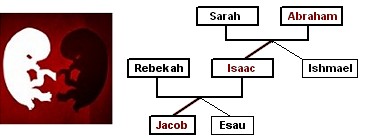
[ The following is related to this week's Torah reading, Toldot (the "generations [of Isaac]"). Please read the Torah portion to "find your place" here. ]
11.16.14 (Cheshvan 23, 5775) Last week's Torah (Chayei Sarah) told how Abraham's faithful servant Eliezer sought a bride for Isaac from among Abraham's relatives living in Mesopotamia. In response to his prayer to the LORD, Eliezer was shown that Abraham's nephew's daughter Rebekah was chosen to be one of the great matriarchs of Israel.
This week's reading (Toldot) continues the story by revealing that Isaac and Rebekah had been married for twenty years but were still without an heir to carry on the family line. Finally their prayers were answered and Rebekah conceived, though not without complications. When she inquired of the LORD about her travail, God told her that she was carrying twins that would be heads of two rival nations, but the younger child would in fact become the promised heir of the chosen people. When the day came for Rebekah to give birth, the first child came out "red and covered with hair," so they called his name Esau ("hairy"); then his brother came out with his hand grasping Esau's heel, so they named him Jacob ("supplanter," from the Hebrew root meaning "heel").
The Torah describes that Esau became a hunter, "a man of the field," while Jacob was ish tam yoshev ohalim, "a wholesome man, who lived in tents." Isaac favored Esau; but Rebekah, believing the promise of the LORD, favored Jacob...
The portion then gives us a look at the spiritual life of the two boys. According to Jewish tradition, on the day of the funeral of their grandfather Abraham, Jacob was cooking lentil soup for Isaac, the traditional mourner's meal. Esau rushed in from a hunting expedition, exhausted and hungry. He then begged Jacob to give him some of "that red stuff" (i.e, ha'dom hazeh), but Jacob answered that he would give him some only if he would sell him his birthright. Esau agreed to the terms and discounted his birthright as being worth only a bowl of beans (on account of this incident, Esau was given the additional name of Edom ("red"). In this manner the Torah describes how Esau "spurned the birthright."
 |
Years later, when Isaac was old and blind, Jacob (with his mother Rebekah's help) tricked Isaac into conferring the blessing of the firstborn upon him, thereby making Jacob the heir of the family, and not Esau. When the ruse was discovered, however, Esau sought to kill his brother, and Jacob was forced to flee his home, never to see his mother again...
Love Stronger than Death...

11.14.14 (Cheshvan 21, 5775) "And Abraham stood up from before the dead ... saying, 'I am an outsider and sojourner (גֵּר־וְתוֹשָׁב)...'" (Gen. 23:2-4). He regarded himself as "a stranger in a strange land," despite being exactly where God had directed him. Abraham felt outside this world, bereft of an abiding place, and yet he was strong in faith. Just as he did not stagger over the promise that from him would come a multitude of descendants, so he did not stagger as he stood up from before the lifeless body of his beloved wife Sarah. Surely he foresaw Sarah with him again, raised from the dead by the hand of God; surely he believed that love was stronger than death... "By faith he [Abraham] went to live in the land of promise, as in a foreign land, living in tents with Isaac and Jacob, heirs with him of the same promise. For he was looking forward to the city that has foundations, whose designer and builder is God" (Heb. 11:9-10).
The message of the gospel is that the love of God is indeed stronger than the power of sin and death... Thank God for Yeshua, our Savior and Healer! Shabbat Shalom, chaverim.
 |
Affliction and Comfort...

11.14.14 (Cheshvan 21, 5775) Some of us carry a deep and stubborn inner pain that refuses to leave us, even after we have poured out our hearts before heaven for deliverance... Perhaps this pain comes from wounds inflicted early in life that have left us feeling betrayed, victimized, and wary of the promise love. God knows our struggle... We can find healing when we learn to "own" the pain and make it part of our story, trusting that God will use it to draw us close to him for our good. After all, God is called "the Father of Mercies and God of all comfort" (אַב הָרַחֲמִים וֵאלהֵי כָּל־נֶחָמָה), and the Lord "comforts us" (lit., "calls us to His side," παρακαλέω) in our afflictions so that we may be able to comfort those who are afflicted with the same comfort with which we ourselves are comforted by God (2 Cor. 1:3-4). Take comfort, then, that your Heavenly Father sees when the sparrow falls; he arrays the flower in its hidden valley; he calls each star by name. More importantly, the Lord sees you and understands your struggle. He will never leave you nor forsake you...
הָרפֵא לִשְׁבוּרֵי לֵב וּמְחַבֵּשׁ לְעַצְּבוֹתָם
מוֹנֶה מִסְפָּר לַכּוֹכָבִים לְכֻלָּם שֵׁמוֹת יִקְרָא
ha-ro·fei · lish·vu·rei ·lev · u'me·cha·besh · le'atz·tze·vo·tam
mo·neh · mis·par · la·ko·kha·vim · le·khu·lam · she·mot · yik·ra

"He is the healer of the brokenhearted and the One who binds up their sorrows.
He counts the number of the stars, to all of them He assigns names."
(Psalm 147:3-4)

Download Study Card
Brokenness distills the intentions of the heart by helping us to be more honest with ourselves. We begin to realize that we are more vulnerable than at first we thought; that our faith is not as strong as we imagined, and that our motives are often mixed and unconscious. Illusions are striped away; idols crumble; deeper levels of selfishness are uncovered; the gap between our words and our deeds is exposed... It is one thing, after all, to intellectually think about faith or to idealize spirituality, but it is quite another to walk out faith in darkness. Yet it is only there, in the rawness of heart, that we discover what we really believe and how our faith makes traction with reality...
I do not see the road ahead of me, I cannot know for certain where it will end. Nor do I really know myself, and the fact that I think I am following your will does not mean I am actually doing so. But I believe the desire to please you does in fact please you, and I hope I have that desire in all that I am doing. I hope that I will never do anything apart from that desire. And I know that if I do this you will lead me by the right road, though I may know nothing about it. Therefore, I will trust you always, though I may seem to be lost and in the shadow of death. I will not fear, for your are ever with me, and you will never leave me to face my perils alone. - Thomas Merton
Take hope, struggling friend... It is surely the will of God for you to find strength in weakness and comfort in affliction. As our Scriptures say, God is "the Father of Mercies and God of all comfort." The Lord calls us to His side to receive his comfort and love.
Our Need for Vigilance...

11.14.14 (Cheshvan 21, 5775) Yeshua forewarned of the moral depravity that would pervade mankind just before the time of his return: "Because lawlessness (i.e., ἀνομία, from -α ('not') + νομος, 'torah') will be increased," he said, "the love of many will grow cold (i.e., ψύχομαι, 'be extinguished')" (Matt. 24:12). Note the link between Torah and love: true love requires respect for God's authority, for without that the divine image is disfigured and desecrated. Likewise the Apostle Paul said the "End of Days" (אַחֲרִית הַיָּמִים) would be marked by "times of peril" (καιροὶ χαλεποί) because people would become increasingly narcissistic, self-absorbed, infatuated with their own self-importance, abusive toward others, disrespectful to elders, ungrateful, heartless, unforgiving, without self-control, brutal, treacherous, and so on (2 Tim. 3:1-4). When Paul said "times of peril," he used the same word (χαλεποί) that described the character of the demonaics mentioned in Matthew 8:28. Therefore, in light of the spiritual war that rages all around us, it is vital that we remain firmly rooted in what is real by taking hold of our identity and provision as children of God. "God has not given us the spirit of fear, but of power (גְּבוּרָה / δύναμις) and of love (ἀγάπη), and of a "sound mind" (σωφρονισμός), i.e., a "delivered" mind, "healed" from carnal fears (2 Tim. 1:7). We are not to be troubled like the world that lives in terror of man, nor are we to crave "security" from the vain devices of mere men (Jer. 17:5). No - we must look to God Almighty, the Master of the Universe. He alone is our Refuge and Defense, the One who gives us steadfast love in the midst of these storms.
"For you yourselves are fully aware (i.e., ἀκριβῶς οἴδατε, "you carefully know") that the Day of the LORD (יוֹם־יְהוָה) will come like a thief in the night" (see Matt. 24:42; 2 Pet. 3:10; Rev. 3:3; 16:15). While people are saying, "There is peace and security," then sudden destruction will come upon them as labor pains come upon a pregnant woman (i.e., the birthpangs of Mashiach: חֶבְלֵי מָשִׁיח), and they will not escape. But you are not in darkness, brothers, for that day to surprise you like a thief" (1 Thess. 5:2-4). Note that a characteristic of this season will be a emphasis on peace and "security," that is, setting up a ubiquitous security grid that will monitor people... In light of this, "let us not sleep, as others do, but let us keep awake and be sober.. having put on the breastplate of faith and love, and for a helmet the hope of salvation (ἐλπίδα σωτηρίας). For God has not destined us for wrath, but to obtain deliverance through our Lord Yeshua the Messiah" (1 Thess. 5:6-9).
 |
Healing a Divided Heart...

11.14.14 (Cheshvan 21, 5775) We need to awaken to reality... The walk of faith involves kavanah (כַּוָנָה), or focus; we are to "press on" to hear the upward call of God (Phil. 3:14). The problem for many of us is that we are irresolute, indecisive, and therefore we hesitate... A divided heart is at war within itself, "two-souled" (δίψυχος) and unstable in all its ways (James 1:8). If "purity of heart is to will one thing," then impurity of heart is the result of simultaneously willing two things... It is therefore a state of inner contradiction, of having two separate "minds" or "wills" that hold contrary thoughts or desires. Yeshua said that "a divided house cannot stand." May it please God to heal us of such ambivalence by making our hearts whole, resolute, steadfast, full of conviction, and entirely awake to the glory of His Presence at our right hand (Psalm 16:8). The LORD is always near; he is not far from each one of us. "Draw near to God (ἐγγίσατε τῷ Θεῷ) and he will draw near to you; purify your hearts, you double-minded" (James 4:8). As it is written: "The LORD is near to all who call on Him, to all who call on Him in truth" (Psalm 145:18). May we be set free from lesser fears that divide the heart and rob the soul of shalom shelemah, God's perfect peace...
הוֹרֵנִי יְהוָה דַּרְכֶּךָ אֲהַלֵּךְ בַּאֲמִתֶּךָ
יַחֵד לְבָבִי לְיִרְאָה שְׁמֶךָ
ho·re·ni · Adonai · dar·ke·kha · a·ha·lekh · ba·a·mi·te·kha
ya·ched · le·va·vi · le·yir·ah · she·me·kha

"Teach me your way, O LORD, and I will walk in your truth;
unite my heart to fear your Name."
(Psalm 86:11)

The heart looks through the eye, and therefore how we see is ultimately a spiritual decision: "If your eye is "single" (i.e., ἁπλοῦς, sincere, focused)," Yeshua said, "your whole body will be filled with light" (Matt. 6:22). The source of our problem, then, is the will, which serves as a gatekeeper of what we admit to ourselves, and the healing comes when we are honest before God and ask Him to be delivered from our ambivalence: "Teach me your way, O LORD, and I will walk in your truth; unite my heart to fear your Name" (Psalm 86:11).
What We Really Need...

11.13.14 (Cheshvan 20, 5775) "Your heavenly Father knows what you need before you ask him" (Matt. 6:8). We sometimes pray for what we think we need but overlook what we really need. For instance, we may pray for health, material blessing, and opportunity, but what we really need is the ability to trust, the willingness to surrender our lives to God without qualification, and the grace to see the good in others and not their faults. These needs are just as real as our need for food and clothing, since apart from grace to extend empathy and love toward others, we will never be truly happy. Love "overlooks" a multitude of sins; it looks beyond the present moment to see with compassion, of kindness, of empathy... What we really need, then, is to be after God's own heart, to see other people as God sees them, and to overlook matters that offend or feed our sense of pride. This is what we truly need, and therefore we trust that the Lord our God mercifully "decodes" our apparent petitions to express what the Spirit of God groans on our behalf (Rom. 8:26).
מְכַסֶּה־פֶּשַׁע מְבַקֵּשׁ אַהֲבָה
וְשׁנֶה בְדָבָר מַפְרִיד אַלּוּף
me·kha·seh · pe·sha' · me·va·kesh · a·ha·vah
ve·sho·neh · ve·da·var · ma·frid · a·luf

"Whoever covers an offense seeks love,
but he who repeats a matter separates close friends."
(Prov. 17:9)

The Law of Faith...

11.13.14 (Cheshvan 20, 5775) "Not everyone who says to me, 'Lord, Lord,' will enter the kingdom of heaven, but the one who does the will of my Father who is in heaven" (Matt. 7:21). And what is the will of the Father but to trust in Messiah for life (John 6:40)? "What must we do, to be doing the works of God?" Yeshua answers: "This is the work of God, that you believe in the One whom he has sent" (John 6:28-29). The Torah of God centers on the Messiah. On that day many will say to me, 'Lord, Lord, did we not ... do many mighty works in your name?' And then will I say to them, 'I never knew you; depart from me, you workers of lawlessness' (Matt. 7:22-23). From this we see that works - even those done in the name of Messiah - are insufficient for life, and that something more is needed. Yeshua wasn't questioning their theology, nor was he denying deeds done "in his name." What he was questioning was their heart, how they knew him, whether they trusted in his love. "As long as Christ remains outside of us we are separated from him." Paradoxically, those who appealed to their good deeds were those who practiced "lawlessness," since they did not keep the law of faith (תורה של אמונה) in God's love...
יְהוָה תִּשְׁפּת שָׁלוֹם לָנוּ
כִּי גַּם כָּל־מַעֲשֵׂינוּ פָּעַלְתָּ לָּנוּ
Adonai · tishpot · shalom · lanu
ki · gam · kol · ma'asenu · pa'alta · lanu

"O LORD, you will establish peace for us,
for You have indeed done for us all our works."
(Isa. 26:12)

Hebrew Study Card
Note that God does the work "for us" (לָּנוּ) and we are His witnesses... Salvation is "of the LORD," and is not the result of our own efforts. Anything of eternal value comes from God alone, who is the beginning and end of grace. "Not by (human) might, nor by (human) power, but by my Spirit, says the LORD of hosts (Zech. 4:6). If we lose sight of this truth, we are again made subject to the "law of sin and death" (תּוֹרַת הַחֵטְא וְהַמָּוֶת), that is, the futile principle of self-justification that constitutes the "wheel of suffering." We can escape this cycle only when we accept the truth about our condition and trust God for our deliverance. It is the "law of the Spirit of Life" (תוֹרַת רוּחַ הַחַיִּים), that is, the inner reign of the Holy Spirit, that sets us free from the reign of sin that leads to death...
It is written: "And the work of the Righteousness One will be peace, and the service of Righteousness One will be quietness and assurance forever" (Isa. 32:17). Note that it is the "work" (singular) of righteousness that is in view here – not the "works" (plural) of righteousness that we might perform (Titus 3:5). In other words, it is the work of the LORD alone, that is, the righteousness and glory of the Messiah, blessed be He, that gives us true peace (Psalm 37:39). Likewise the "service of righteousness" refers to the singular "avodah" of the great High Priest "after the order of Malki-Tzedek," which is the eternal service of intercession established by the inviolable will and counsel of Almighty God (Heb. 7:20-21). This avodah does not refer to acts of service performed by human beings in their religious ceremonies (i.e., the Levitical priesthood with its various forms of sacrificial worship), but rather the perfect act of service and sacrifice of Yeshua given upon the cross -- the everlasting atonement and eternal redemption secured by the greater priesthood of Yeshua (Heb. 9:12). "For our sake He made him to be sin who knew no sin, so that in him we might become the righteousness of God (δικαιοσύνη θεοῦ)." Only God through Yeshua can give us true inner peace and security forever; only Yeshua gives us peace with God.
 |
Our Daily Teshuvah...

11.12.14 (Cheshvan 19, 5775) There are first things without which nothing else follows... For instance teshuvah (i.e., "repentance") means letting go of those desires that block or impede our reception of God's grace... This may include letting go of the supposed need to find our self-worth based on our performance rather than by accepting God's love. Therefore the very first commandment is always, Anochi Adonai Elohekha: "I AM the LORD thy God," since this is the invitation to know God's heart. Finding God's heart for you is basic to the rest of the adventure of faith.
We must find focus to escape the distractions of the hour. Keep coming back! Keep turning! Teshuvah is a daily decision of the heart to seek what is real... abiding... true.
Hold Fast to Hope...

11.12.14 (Cheshvan 19, 5775) "Never despair! Never! It is forbidden to give up hope" (Nachman). Hope is the affirmation that your life has profound meaning, eternal significance, and ultimate healing; it is the expectation that all shall be made well, even if the present hour is darkness. "Be of good courage," said Yeshua, "don't be afraid, for I have overcome the world" (John 16:33). The message of the gospel is that God's love is the healing center of all reality; the cross (and resurrection) of Messiah overrules all sin, sickness, and even the power of death. Let not your heart be troubled: God is light and His light overcomes the darkness (Psalm 27:1; 1 John 1:5; James 1:7). The Hebrew word for hope is tikvah (תִּקְוָה), from a verb (קוָה) that means to stretch (as a line) in tension, to twine around like strands in a rope. It glorifies God to hope in the LORD, looking for him with eager anticipation, steadfast in your conviction, tightly "bound up" in the message of his salvation (יְשׁוּעָה). Those who wait upon the LORD are renewed in strength (וְקוֹיֵ יְהוָה יַחֲלִיפוּ כחַ) so that they can continue to "press on" in faith despite appearances of loss or failure (Gen. 49:18; Isa. 40:31; Phil. 3:4). Therefore the Spirit cries out: "Hope to the LORD; be strong and strengthen your heart; and (again) hope to the LORD" (Psalm 27:14).
קַוֵּה אֶל־יְהוָה חֲזַק וְיַאֲמֵץ לִבֶּךָ
וְקַוֵּה אֶל־יְהוָה
ka·veh · el · Adonai · cha·zak · ve'ya·metz · lib·be·kha,
ve-ka·veh · el · Adonai

"Hope to the LORD; be strong and let your heart be strengthened;
and (again) hope to the LORD"
(Psalm 27:14)

Download Study Card
Note that the verb ve'yametz is a causal active stem (i.e., Hiphal) in the "jussive mood," which means it is imperative – "command your heart to be strengthened," or "let your heart be made strong!" Make the decision to be strong in the LORD, and the LORD will give you strength to bear your present suffering: "Look to the LORD (קַוֵּה אֶל־יְהוָה) and find hope." Amen. God will help us, and he will help us before he will help us!
Finding a Bride for Isaac...
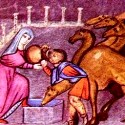
[ The following entry is related to this week's Torah reading, parashat Chayei Sarah... ]
11.11.14 (Cheshvan 18, 5775) Though he is not explicitly named in the account, the "elder servant" commissioned to find a bride for Isaac was undoubtedly Eliezer of Damascus (Gen. 15:2). Eliezer (אֱלִיעֶזֶר), whose name means "my God will help," is regarded as a consummate example of a godly servant, a picture of the Holy Spirit (רוּחַ הַקּדֶשׁ) sent on a mission to find a bride for the Sacrificed Seed of Abraham (i.e., the Messiah Yeshua). Eliezer dutifully departs on his mission and waits by the "well of water," interceding on behalf of righteousness... He asks for a witness from heaven: "Let the young woman to whom I shall say, 'Please let down your jar that I may drink,' and who shall say, 'Drink, and I will water your camels' -- let her be the one whom you have appointed" (Gen. 24:13-14). Rebekah's response of kindness and generosity (i.e., chesed: חֶסֶד) to a tired wayfarer demonstrated God's choice. Note that the test concerned the inward character of the woman, not her status or beauty or other worldly factors. And since a single camel needs about 25 gallons of water and requires 10 minutes to drink, watering ten camels would require 250 gallons and at least a couple hours of work running back and forth to the well - no small task for anyone! Rebekah possessed Abraham's qualities of gracious hospitality and diligence...
Eliezer's prayer to find a bride for Isaac (the very first recorded prayer of the Torah) appealed for a miracle such as splitting the sea, but instead relied on the providential and "hidden hand" of God that governs the affairs of everyday life... His prayer at the well relied on God to direct him to a woman who, like Abraham, would extend compassion to a person in need (חֶסֶד). The Torah therefore reveals that far from being a coincidence or chance encounter, then, "before he had finished speaking, behold Rebekah..." (Gen. 24:15). "Before they call I will answer; while they are still speaking I will hear" (Isa. 65:24).
Rebekah was willing to leave her family - all that she knew - based on an "otherworldly" promise. Her response to the invitation was simply: "I will go"(Gen. 24:58). This courageous willingness was likewise a characteristic of Abraham who was willing to leave his homeland in search of the greater things of God. Like Abraham, Rebekah was ger ve'toshav (גֵּר־וְתוֹשָׁב) - a "stranger and a sojourner" - who left everything behind in order to become part of God's chosen family...
Note again that the Divine Presence is revealed in this story as an effect of both Eliezer and Rebekah's inner life and character... God was present in the story through the concrete actions of people that discerned his touch (more here).
 |
The Akedah of Sarah...
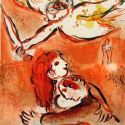
[ The following entry is related to this week's Torah reading, parashat Chayei Sarah... ]
11.10.14 (Cheshvan 17, 5775) Recall that Sarah gave birth to Isaac when she was 91 years old (Gen. 17:17, 21), and she later died when Isaac was 36 years old, at the age 127 (Gen. 23:1). And while the Torah does not explicitly state the cause of her death, we are told about her death following the dramatic episode of the sacrifice of Isaac (Gen. 22), and the midrash Tanchuma therefore links the two together by saying Sarah died from shock after learning about the ordeal of her son at Moriah. It was just too much for her heart to bear: "And a sword will pierce through your own soul also..." (Luke 2:35). Therefore Jewish tradition associates the cries of Sarah with the blasts of the shofar during Rosh Hashanah. The broken notes of the shofar are thought to recall her crying for her son...
Isaac was the first "Jewish baby" born to the world, the promised son, the miracle child and the heir of Abraham. As the firstborn son of God's promise, without him the whole world would fall apart, and there would be no salvation to come... So when Sarah heard that Isaac was offered at Moriah, her soul departed from her and she thought the world was falling apart. She prayed to God: "Let me die for my son; let me die in place of my son..." Sarah's love was so great it brought Isaac back to life from the dead.
Note: We study these things, bring them again to our hearts, because it is part of our great yerushah (יְרוּשָׁה), our heritage, in Messiah Yeshua... The Torah tells our story as the people of God; it is the context and framework of the entire Bible: "Listen to me, you who pursue righteousness, you who seek the LORD: look to the rock from which you were hewn, and to the quarry from which you were dug. Look to Abraham your father and to Sarah who bore you; for he was but one when I called him, that I might bless him and multiply him" (Isa. 51:1-2). For more on this topic, see "The Akedah of Sarah," by clicking here.
 |
The Decision to Love...

[ The following entry is related to this week's Torah reading, parashat Chayei Sarah... ]
11.09.14 (Cheshvan 16, 5775) From our Torah portion this week we read, "Then he (Isaac) took Rebekah and she became his wife, and he loved her..." (Gen. 24:67). The sages note the sequence -- first he took her to be his wife, and then he loved her - to highlight that marriage is based on a spiritual decision to love rather than a feeling based on passion or self-interest. Feelings of passion and personal satisfaction may develop from the decision to love, but these by themselves cannot form the love's foundation. Meaningful love is grounded in a decision to honor and cherish the other person, and therefore is spiritual in nature. As C.S. Lewis said, don't let your happiness depend on something you may lose. "Aim at heaven, and you get earth thrown in; aim at earth, and you get neither." Rebekah was willing to leave her family - all that she knew - based on an "otherworldly" promise. Her response to the invitation was simply: "I will go"(Gen. 24:58); Isaac, on the other hand, "took her to be his wife," that is, he pledged to be family for her...
Of course the world gets all this backward and thinks that selfish satisfaction is the basis of a marriage relationship, and therefore, as soon as one (or the other) person feels unsatisfied, the relationship is jeopardized. The truth, however, is that marriage is above all the duty to honor and revere the beloved, regardless of matters of personal self-interest.
Note: The very first time the word "love" occurs in the Torah (i.e., ahav: אַהַב) concerns Abraham's love for his son Isaac (Gen. 22:2), and the second time concerns Isaac's love for Rebekah (Gen. 24:67) – a picture of Yeshua's love for his chosen bride (kallat mashiach).
 |
Parashat Chayei Sarah...
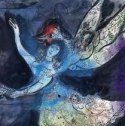
11.09.14 (Cheshvan 16, 5775) Our Torah reading for last week (i.e., Vayera) told how God was faithful to Abraham and Sarah by miraculously giving them a son (Isaac) in their old age. Nonetheless, Abraham faced his greatest test of all by being asked to offer up his promised child as a sacrifice on Mount Moriah, the place of the future Temple. On account of his willingness to obey, God promised He would multiply Abraham's offspring as the stars of heaven and that in his seed (singular) all the nations of the earth would be blessed.
This week's Torah portion is called Chayei Sarah (חיי שרה), the "life of Sarah," though it begins (paradoxically) with the account of her death, and tells how the first great matriarch of the Jewish people was buried in the Cave of Machpelah in Hebron, a burial site which Abraham had purchased from Ephron the Hittite for four hundred shekels of silver.
After Sarah was buried, Abraham sought a wife for his son by commissioning his faithful servant Eliezer (whom Abraham had originally thought would be his heir), to go among his relatives living in Mesopotamia to seek for a bride for Isaac. Eliezer (i.e., אֱלִיעֶזֶר, lit., "My God will help") then set out on the 550 mile journey to Haran (also called the City of Nahor and the place where Abraham's father died), taking ten camels laden with gifts in search of a suitable bride. Providentially, and in answer to his prayer, as soon as Eliezer reached the city of Nahor he encountered Abraham's grand niece Rebekah drawing water at a well, where she graciously provided water for him and for his ten camels, thereby confirming that she was God's choice for Isaac.
For more about this week's Torah, please read the summary page for Chayei Sarah and its related articles. You can also download the Shabbat Table Talk for the Torah portion here:
Whisper of the Spirit...

11.07.14 (Cheshvan 14, 5775) The Spirit speaks to the heart using a "still and gentle whisper" which will be nearly inaudible unless we "make room within ourselves" to listen... If we entertain negative thoughts or messages, however, our spiritual receptivity will be impaired or damaged. For example, if we listen to the news of this world and believe its messages of fear or anger, we will squelch the whispering of the Holy Spirit. The Name YHVH (יהוה) means "God is Present" and near, as close as your heart. The LORD is near, even when you might feel lost and far away... We attune ourselves to hear kol demamah dakkah (קוֹל דְּמָמָה דַקָּה), God's "still, small voice," only when we are quieted, not when we are listening to the false narratives and nonsense of this world. When the world casts its spell to entice you to lust or be afraid, resolutely affirm to yourself what is real, true, and abiding... There is peace for you: "In returning and rest you shall be saved; in quietness and in trust shall be your strength" (Isa. 30:15).
"Where there is no prophetic vision the people cast off restraint, but the one who keeps Torah is made happy" (Prov. 28:19). Without hope, we begin to die inside… We keep our focus by consciously recalling the goal, purpose, and true end of life. We find the will to live as we immerse ourselves in the truth revealed by the Hebrew prophets. "You have said, "Seek my face." My heart says to you, "Your face, LORD, do I seek" (Psalm 27:8), "With my whole heart I seek you; let me not wander from your commandments" (Psalm 119:10). "Seek the LORD and his strength; seek his presence continually" (Psalm 105:4).
 |
Testimony of the Sabbath...

11.07.14 (Cheshvan 14, 5775) Every Shabbat we testify that the LORD is both our Creator and our Redeemer (Gen. 1:31-22; Deut. 5:15). It is a "sign" (אוֹת) that God has set us apart as His own treasured people (Exod. 31:13; 1 Pet. 2:9). The story of creation connects us to what is universal and godly in the universe, and it accounts for our sense of transcendence and the sacred value of all of life... The story of our redemption (both the story of the Exodus and the story of the cross) reveals that God's passion for us is everlasting, and that he gives all of Himself for the sake of relationship with us... By reason of our creation by God, we are connected to the original man Adam, adam ha-rishon (אָדָם הָרִאשׁוֹן), called the "son of God" (Luke 3:38), who was a pattern or "typw" (τύπος) of the One to come (Rom. 5:14), just as we are connected by our redemption to the second Adam, adam ha-sheni (הָאָדָם הַשֵּׁנִי), the "son of Man," Yeshua our Lord.
Just as there is a deeper sense of Torah that Paul appealed to make his case that he was not teaching "against the law" (e.g., Gal. 3:16-18), so there is a deeper sense of rest (שָׁבַת) that God promised those who are trusting in Him (מְנוּחַת שַׁבָּת, Heb.4:9). This rest comes from relying upon the finished work of Yeshua as our Torah righteousness before the Father. The principle of Sabbath is valid, just as the principle of adhering to faithful love is (i.e., the positive expression of the commandment not to commit adultery). "There is a rest for the people of God" (Heb. 4:9-10) therefore refers to the deeper sense of peace that comes from resting in the Lord's provision given in the Messiah, blessed be He.
The Mishnah (Avot 3:1) says: "Reflect upon three things and you will not come to the hands of transgression. Know from where you came, where you are going, and before whom you are destined to give a judgement and accounting." "I shall walk before the LORD in the land of the living" (Psalm 116:9).
Note: For more on this subject, see "The Sign of the Sabbath."
 |
Mercy over Judgment...

[ The following entry is related to this week's Torah reading, parashat Vayera... ]
11.07.14 (Cheshvan 14, 5775) Some of the traditional Jewish commentators have argued that Abraham's greatness was not that he took his son to Mount Moriah to sacrifice him, but rather that he didn't go through with it – and that constituted the real test. At first Abraham was tempted to unthinkingly obey the voice of Elohim (אֱלהִים) – to hear the voice of judgment – rather than to hear the voice of the LORD (יְהוָה) saying, "Let him go and do him no harm..." It was only after this revelation of the LORD that Abraham's eyes were opened and he saw the ram caught in the thicket to be offered up instead. God indeed provided the lamb to offer up in place of his own destruction, just as Yeshua became the "Lamb of God" (שֵׂה הָאֱלהִים) who delivered us from the judgment and death (2 Cor. 5:21).
The sacrifice of Abraham's dream was the first step – which instilled within his heart a receptivity he could never produced by himself.... It was only after he faced God's impossible demand that he was able to see God's great heart.
חֶסֶד־וֶאֱמֶת נִפְגָּשׁוּ צֶדֶק וְשָׁלוֹם נָשָׁקוּ
che·sed ve·e·met nif·ga·shu, tze·dek ve·sha·lom na·sha·ku

"Love and truth have met, righteousness and peace have kissed."
(Psalm 85:10)

Download Study Card
Man prays to God, but to whom does God pray? For what does He pray? Or do you think that the Almighty has no desires of His own, no yearning of heart? The sages of the Talmud believed that God indeed addresses himself: Yehi ratzon milfanai, "May it be acceptable before me, may it be My will, that my compassion overcome my anger, and that it may prevail over my justice when my children appeal to me, so that I may deal with them in mercy and in love" (Berachot 6a). This is the deeper unity of the Name YHVH (יהוה), the Savior and LORD, revealed to Moses after the sin of the Golden Calf (Exod. 34:6-7), and this is the essential meaning of the cross of Yeshua, where the LORD passionately "prayed within Himself" so that His compassion would overcome His fearful judgment for our sins.
Only the cross allows God's righteousness and mercy to "kiss" (Psalm 85:10; 89:14); only the cross reveals the true Holy of Holies where the blood was placed over the Ark of the Law; only the cross intimates the Inner Sanctum of God's heart. Because of the cross, a holy God is able to truly love and help the trusting sinner (Rom. 3:26). It is written: "Righteousness and justice are the foundation of your throne; steadfast love and faithfulness go before you" (Psalm 89:14). Because of Yeshua, God is vindicated as entirely just - and the Justifier of those who trust in His redemptive love (Rom. 3:24-26). Yeshua is the prayer of God the Father's on behalf of His children...
The will of God - His heart's yearning and desire - is for his children to receive his love (2 Pet. 3:9; 1 Tim. 2:4; John 3:16; Ezek. 18:23). As Yeshua prayed, "Holy Father, keep them in your Name, which you have given me, that they may be one, even as we are one... I in them and you in me, that they may become perfectly one, so that the world may know that you sent me and loved them even as you loved me" (John 17:11,23). Yeshua died on the cross to bear the shame for your sins, to be sure, but he did this so that you could be accepted and securely loved forever.... It is the love of God that is the goal of all things, after all. When Yeshua cried out, "It is finished" and breathed his last breath as He died for our sins upon the cross, the greatest exhalation of the Spirit occurred, the greatest sigh, the greatest utterance was ever declared. The sacrifice of Yeshua for our deliverance was God's final word of love breathed out to a lost and sinful humanity. Mercy triumphed over judgment.
Note: For more on this see subject, see the "Temptation of Grace."
 |
The Spirit Makes Alive...
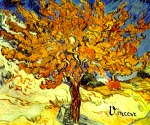
11.06.14 (Cheshvan 13, 5775) The Akedah of Isaac – Abraham's binding of his son in obedience to God's command – represents an impossible demand, and yet Abraham's passion leads us to ask what we are prepared to sacrifice? Our Lord Yeshua calls us to die to ourselves, to leave everything behind to follow him, and yet how can we honestly do this apart from a radical heart change, a transforming touch from heaven, the miracle of the Spirit making all things new for us? As Yeshua said: "It is the Spirit that makes life (ὸ πνεῦμά ἐστιν τὸ ζῳοποιοῦν); the flesh is no help at all" (John 6:63).
We tend to think of the "flesh" as the lower nature, revealed in the hunger of the alienated soul, etc., but it is also manifested in the aspiration of "religion" and other attempts to outwardly manage appearances or to control the soul itself. The Spirit of God gives us cherut (חֵרוּת), or the power to walk in real newness of life. οὗ δὲ τὸ πνεῦμα κυρίου, ἐλευθερία - "Where the Spirit of the LORD is present, there is liberty" (2 Cor. 3:17).
 |
Response of the Heart...

11.06.14 (Cheshvan 13, 5775) King David wrote, "You have said, 'Seek my face,' and my heart says to you, 'Your face, LORD, do I seek'" (Psalm 27:8). This is the "antiphon" of the great Shema: God calls us to hear His Voice, so we are right to earnestly ask Him to be divinely enabled to hear what the Spirit is saying...
הַשְׁמִיעֵנִי בַבּקֶר חַסְדֶּךָ
כִּי־בְךָ בָטָחְתִּי
הוֹדִיעֵנִי דֶּרֶךְ־זוּ אֵלֵךְ
כִּי־אֵלֶיךָ נָשָׂאתִי נַפְשִׁי
hashmieini · vaboker · chasdekha
ki · vekha · vatachti
hodieini · derekh · zu · elekh
ki · eleykha · nasati · nafshi

"Cause me to me hear your lovingkindness in the morning,
for in You do I trust.
Cause me to know the way I should go,
for I lift up my soul to you"
(Psalm 143:8)

David's request is to be empowered to hear God's loving voice call at the start the day; to be assured of God's kindness and favor (chesed). Note that the Hebrew verbs used in this verse are both Hiphal imperatives, implying that God is the agent or cause of the action. We lift up our heart in expectation, understanding that the LORD alone is the One who is able to draw us near to Him: "You [God] cause me to hear... You [God] cause me to know..."
Held in the Dark...

11.06.14 (Cheshvan 13, 5775) The chasidic teacher Rabbi Bunim told his students that they should always carry two scrolls with them, one in each pocket. On one it should read, "I am dust and ashes" (אָנכִי עָפָר וָאֵפֶר) and the other it should read, "the world was created for me" (בִּשְׁבִילִי נִבְרָא הָעוֹלָם). This is to remind us that we must live in the tension that sees both the brokenness of life as well as its ultimate healing. Yea, though we walk through "the valley of the shadow of death" (גֵּיא צַלְמָוֶת), that is, the present world of transience and decay, we will fear no evil, for LORD is our Shepherd (הרועה אדוננו) who loves us and is guiding our way back home...
Reasons of Faith...
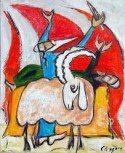
[ The following entry is related to this week's Torah reading, parashat Vayera... ]
11.05.14 (Cheshvan 12, 5775) It is no small thing to believe the message of Yeshua, and indeed, it involves a passionate inwardness that scandalizes the rational mind. Our father Abraham is extolled as the model of righteous faith, but he was tested to sacrifice the moral law (e.g., "thou shalt not murder") when he lifted up the knife to slay his beloved son Isaac. Faith requires you to change your everyday thinking, to go beyond natural expectations, to "walk on water." In the case of Yeshua, we are confronted with the "Absolute Paradox," namely, the God-Man, the Infinite-made-Finite, the Holy-made-Profane, the Sinless-made-Sin, who says to you: "I AM the resurrection and the life. Whoever believes in me, though he die, yet shall he live, and everyone who lives and believes in me shall never die. Do you believe this?" (John 11:25-26). Yeshua promies: You will never die; you will never hunger; you are made whole through my brokenness; you will be cleansed by my defilement, and so on. It's not just hard to believe, it's impossible, which is why it is a miracle of God to be saved (Matt. 19:26). "It is the Spirit that gives life; the flesh is no help at all" (John 6:33). The difference is Yeshua: Salvation is of the LORD. We are enabled to love and know God by means of his inner life and spirit, not by means of good intentions or religious zeal. As Pascal once said, "The heart has its reasons of which reason knows nothing," and yet faith is a miracle, the power of God....
"Faith's conflict with the world is not a battle of thought with doubt, thought with thought. It is a battle of character. The person of faith is a person of character who does not insist upon comprehending everything. Now comes the conflict. The world insists that to believe what you cannot comprehend is not only blind obedience but obscurantism, stupidity, and so on. The world wants to alarm the believer against such foolishness. This is precisely why faith is a task for the person of character." (Soren Kierkegaard)
An honest theology must find a place for mystery, for "seeing through a glass darkly," and for the apprehension of awe and wonder. Philosophy (not science) asks the question: "Why is there something rather than nothing at all?" This is a question regarding the "why" of existence itself, the profusion of life as it surrounds us. Is there a reason for existence, a purpose, a direction, a radical meaning? Faith "sees what is invisible" by experiencing reality as revelation: the mystery of life points beyond itself to God's creative and sustaining presence: "In Him we live and move and have our being" (Acts 17:28; Rom. 1:20). Cut open a seed and what do you see, but "the hidden power that makes the fruit grow toward the sky." Likewise what is most real about us is shrouded in profound mystery. We are finite, our lives are short and bounded by darkness, yet we sense God's Spirit, the hidden power that upholds our souls, and we trust that we will indeed live forever because of God's love. As theologian Paul Tillich wrote: "The question of being is not the question of any specific being, its existence and nature, but it is the question of what it means to be. It is the simplest, most profound, and absolutely inexhaustible question – the question of what it means to say something is. The word "is" hides the riddle of all riddles, the mystery that there is anything at all." Though we might try to explain God by way of logic and doctrine, in the end it is the mystery of "Messiah in you - the hope of glory."
Note: For more on this vital topic, see "Faith Surpasses Reason."
 |
The Way of the LORD...

[ The following entry is related to this week's Torah reading, parashat Vayera... ]
11.05.14 (Cheshvan 12, 5775) From our Torah portion this week (i.e., parashat Vayera) we note that after delivering the announcement of the coming heir to both Abraham and Sarah, the three angels set out to finish their mission (Gen. 18:1-16). Abraham escorted them on their way. The chief Angel (i.e., the Angel of the LORD) then rhetorically asked his two angelic companions, "Should I hide from Abraham what I am about to do (i.e., go to Sodom), seeing that Abraham shall surely become a great and mighty nation, and all the nations of the earth shall be blessed in him? For I know him (כִּי יְדַעְתִּיו), that he will command his children and his household after him, and they shall keep the way of the LORD (דֶּרֶךְ יהוה), to do charity and justice (לַעֲשׂוֹת צְדָקָה וּמִשְׁפָּט); that the LORD may bring upon Abraham that which he has spoken of him" (Gen. 18:17-19). Notice here that the LORD commends Abraham because he would instruct his family in the way of the LORD, namely, to do tzedakah (i.e., charity, righteous giving) and to promote justice in the earth...
When we recite the Shema, we repeat the admonition to follow Abraham's example: "these words that I command you today shall be on your heart, and you shall teach them diligently to your children (וְשִׁנַּנְתָּם לְבָנֶיךָ), and shall talk of them when you sit in your house, and when you walk by the way, and when you lie down, and when you rise..." (Deut. 6:5-7). We know however, that though Abraham had several sons, we call upon the the God of Isaac (Gen. 28:13), and likewise, though Isaac had two sons, Jacob and Esau, but we call upon the God of Jacob (Exod. 3:6). We are responsible to instruct our children to keep the way of the LORD, though we must entrust the spiritual results to God's hands....
 |
The Sacrificed Seed...

[ The following entry is related to this week's Torah reading, parashat Vayera.... ]
11.04.14 (Cheshvan 11, 5775) "And Abraham took the wood of the burnt offering and laid it on Isaac his son. And he took in his hand the fire and the knife. So they went both of them together" (Gen. 22:6). Isaac was about 37 years old at this time and needed to understand what was being asked of him: "And Isaac said to his father Abraham, "My father!" And he said, "Here am I, my son." And he said, "Behold, the fire and the wood, but where is the lamb for a burnt offering?" (Gen. 22:7). This is the first word of dialog recorded over the three day journey... It is hard to imagine Isaac's pathos during this exchange. Abraham replied, "God will provide for himself the lamb for a burnt offering, my son." So they went both of them together (Gen. 22:8). Notice that the Hebrew could be read: "God will provide for himself the lamb for the burnt offering -- my son!" (ירְאֶה־לּוֹ הַשֶּׂה לְעלָה בְּנִי) - making it plain that Isaac would be offered upon the altar. The Torah then repeats the phrase, "and they both walked on together," indicating that Isaac had accepted his sacrificial death in obedience to his father's will...
"And when they came to the place of which God had told him, Abraham built the altar there and laid the wood in order and bound Isaac his son (וַיַּעֲקד אֶת־יִצְחָק בְּנוֹ) and laid him on the altar, on top of the wood" (Gen. 22:9). According to the Talmud, Isaac asked his father to make the knots on his hands and feet tighter - not out of fear that he would change his mind and begin to resist - but in order to encourage his father to offer the sacrifice properly (Bereshit Rabbah 56:8). Like the Suffering Servant who would come after him, Isaac "set his face like a flint" to fulfill God's will (Isa. 50:7).
Isaac kept his eyes directed toward heaven as he lay tightly bound and motionless upon the altar. He awaited the final blow and wanted it to fall with trust and obedience within his heart. It was to be a shared sacrifice between the beloved son and his father. Finally "Abraham stretched out (שׁלח) his hand and took the knife to slaughter (i.e., לִשְׁחט, from shechitah) his son" (Gen. 22:10). The Talmud says that when Abraham "stretched out" his hand, he briefly looked at the knife to determine if it was ritually fit, and this delay was the precise moment when the Angel of the LORD (מַלְאַךְ יהוה) called out to him from heaven and said, "Abraham, Abraham!" (Gen. 22:11). (Note the repetition of the name "Abraham" during this second call.) According to various midrashim, when Abraham put his knife to his son's neck, Isaac's soul departed from him, but it returned when the Angel of the LORD said, "Do not lay your hand on the boy or do anything to him, for now I know that you fear God, seeing you have not withheld your son, your only son, from me" (Gen. 22:12). Abraham then immediately released Isaac and recited the blessing, "Blessed are You, LORD, who revives the dead" (בָּרוּךְ אַתָּה יהוה מְחַיֶּה הַמֵּתִים).
"I believe in You, O Holy One, though at times there no longer seems any reason for believing..." Here is Abraham, who counted the stars in hope, who trusted God for an heir, a promised son - and from this son another, and from that another, and another, until he envisioned his descendants "as the dust of earth" (Gen. 13:16; 15:5-6), and yet here is Abraham lifting up his knife to sacrifice his son, his beloved child, his promise, his future, his dream. Remember that Abraham did not know the end of the story before it began, and therefore his faith attested: "Though he slay me, I will trust in him."
Some people tend to "explain away" the passion of Abraham and Isaac by quoting the New Testament verse: "He [Abraham] considered that God was able even to raise him [Isaac] from the dead, from which, figuratively speaking, he did receive him back" (Heb. 11:19) -- as if this would make the sacrificial act any easier! Again we must bear in mind that neither Abraham nor Isaac knew "the end of the story" before they chose to obey God. As I've mentioned before, simply "knowing about" God is not the same thing as personally trusting Him with your life... This is the distinction between emunah (אֱמוּנָה) and bittachon (בִּטָּחוֹן). Simply knowing about God can lead to a sense of "distance," to theological abstractions, to dogmas and creedal formulas. Rabbi Bechaya put the distinction this way: "Everyone who trusts has faith, but not everyone with faith trusts." Bittachon is an intuitive awareness of the personal love of God for your life, coupled with complete trust that He cares for you (Rom. 8:28). It is an expectation that the love of God is for you, too, despite the test.
Note: For more on this crucial subject, see, "The Sacrificed Seed: Further thoughts about the Akedah," by clicking here.
 |
Beware of False Prophets...

11.04.14 (Cheshvan 11, 5775) "Beware of false prophets, who come to you in sheep's clothing but inwardly are ravenous wolves. You will recognize them by their fruits. Are grapes gathered from a thorn bushes, or figs from thistles? Therefore you will recognize them by their fruits" (Matt. 7:16,20). From a distance berries on bramble could be mistaken for grapes, or flowering thistles could be mistaken for growing figs, but not for long... Similarly the "fruit" of a person's life – his words and deeds – will eventually reveal the "root" of what he is. Sooner or later the soul discloses its nature, regardless of how it may be disguised through outward forms of behavior or controlled through carnal desire. A false prophet (נביא שקר) sows unbelief, confusion, divisiveness, and bitterness (Luke 6:45; 1 Tim. 6:3-5; 2 Tim. 2:17-18; 2 Pet. 2:1-22; etc.). Such a "prophet" might be able to fake spiritual power, to put on a show of sanctity, or to manage appearances, but he or she cannot "manufacture" the fruit of the Spirit (פְּרִי הָרוּחַ), since such fruit is the outgrowth of God's miraculous life implanted within us as we live in Yeshua (John 15:1-5; Gal. 5:22-23). "It is the Spirit that gives life; the flesh is no help at all" (John 6:33).
 |
 |
Hidden Life in God...

11.03.14 (Cheshvan 10, 5775) It is said that the tzaddikim (righteous) are "doubly called" by God: "Abraham, Abraham" (Gen. 22:11), "Jacob, Jacob" (Gen. 46:2), "Moses, Moses" (Exod. 3:4), "Samuel, Samuel" (1 Sam. 3:10), "Saul, Saul" (Acts 9:4), and so on, because the LORD calls to both the soul in this world but also to the soul in heaven. When God told Abram to "get out of your land," he called him to focus on heavenly places – to find his identity there. "Seek ye first the kingdom of God..." (Matt. 6:33). Thus David says, "I shall walk before the LORD in the land of the living" (Psalm 116:9), which means all his deeds would be done for the sake of heaven. The earth then becomes the "land of the living," or "the land that I will show you," as Abram was told (Gen. 12:1). Likewise, followers of Yeshua no longer find their identity in this world but rather through their spiritual union with the resurrected LORD (Gal. 2:20; 6:14; Eph. 1:3; 2:6)... Therefore we are told to "seek the things that are above (τὰ ἄνω ζητεῖτε) where the Messiah is seated at the right hand of God; focus your thoughts on the things above - not on things here on earth - for you have died, and your life has been hidden (κέκρυπται) with Messiah in God. Then when the Messiah, who is your life, appears, you too will appear with him in glory" (Col. 3:1-4).
So have you heard the "upward call of God in Yeshua the Messiah" (Phil. 3:14)? This "upward call" (τῆς ἄνω κλήσεως) is the invitation from above, the sound of the heavenly Voice, beckoning you to enter the "high country" of the world to come. As Yeshua said, "I am from above (ἐγὼ ἐκ τῶν ἄνω)." Our true identity is not found in this world and its vain philosophy. The cross brings these things to an end, as we "cross over" from the realm of the dead to the realm of life (Gal. 6:14). Can you say: "I have been crucified with Messiah. It is no longer I who live, but Messiah who lives in me. And the life I now live in the flesh I live by faith in the Son of God, who loved me and gave himself for me" (Gal. 2:20)?
The great commandment is always Shema - listen - and heed God's Voice: "And your ears shall hear a word behind you, saying, "This is the way, walk in it," when you turn to the right or when you turn to the left (Isa. 30:21). At any given moment of our day, then, we can attune ourselves to hear the "upward call" and come "boldly before the Throne of Grace" (Heb. 4:16). The world knows nothing of this realm and is enslaved by appearances and the delusions of this realm, olam hazeh. As Yeshua said, "To you it has been given to know the mysteries of the kingdom of heaven, but to them it has not been given" (Matt. 13:11). The Spirit always says, "Come, my people, enter your chambers, and shut your doors behind you" (Isa. 26:20). The LORD beckons: "Call to me and I will answer you, and will tell you great and hidden things that you have not known" (Jer. 33:3). And I looked, and behold, a door standing open in heaven! And the first voice, which I had heard speaking to me like a trumpet, said, "Come up here, and I will show you..." (Rev 4:1). The repeated or "double call" of heaven is the voice of love. The Beloved calls out to the beloved: "Arise, my love, my beautiful one, and come away" (Song 2:10, 2:13).
 |
In the Name of Love...
11.03.14 (Cheshvan 10, 5775) The word used in the ancient Greek Torah (i.e., the Septuagint) to translate the original Hebrew word kapporet (i.e., the "cover" or "crown" of the Ark of the Covenant) is hilasterios (ἱλαστήριος), the very same word used to describe the atonement secured at the cross of the Savior: "God put forward Yeshua as a propitiation (ἱλαστήριον) through faith in His blood" (Rom. 3:25). In other words, the shedding of Yeshua's blood - represented by His Passion upon the cross - was "presented" upon the Heavenly Kapporet, that is, before the Throne of God Himself, to make eternal atonement for our souls (Heb. 9:12). Yeshua is our great High Priest after the order of Malki-Tzedek (i.e., Melchizedek), the One who provides everlasting forgiveness for our sins (see Heb. 9:7-10:10). Because of His sacrifice, the parochet - the wall-like covering separating the Holy of Holies - was rent asunder and God's love was let loose upon the world!
"Dear Lord our God, we plead your solution, your remedy, to the problem of our sin; we appeal to your compassion as the way to overcome our frailty, our self-imposed exile, our fear, and our inner sense of loss... Deliver us from whatever remains within us that hides, that denies, and that turns away from you.... For the sake of your love - your very passion that willingly bore our sin and shame so that we would be covered with your robes of belonging and acceptance - heal us, help us, and yield our hearts to you. We pray to You, trusting that your salvation, your yeshuah, is all we shall ever need. O LORD our God, see the life of Yeshua you put within us; hear the voice of the Spirit you breathe into our hearts. Amen...."
The Law of Faith...
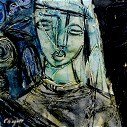
11.03.14 (Cheshvan 10, 5775) "The righteous shall live by faith" in the promise of God's unconditional love (Hab. 2:4; Rom. 1:17). The Torah of faith (תּוֹרַת הָאֱמוּנָה) therefore includes these additional commandments from the heart of Yeshua: 1) "Thou shalt believe thou are my beloved - entirely accepted and entirely forgiven"; 2) "Thou shalt forget the shame of thy past"; 3) "Thou shalt stop thinking of your sin but rather of My great remedy for you"; 4) "Thou shalt let me carry your woundedness far away, yea, to the bottom of the sea"; 5) "Thou shalt live in My love and be filled with its spirit," and 6) "Thou shalt be made new." We are to know ourselves as "dead to sin but alive to God" (Rom. 6:11), which means we die to despair, we die to fear of abandonment, yea, we die to death itself, and now we are alive to hope, alive to healing, yea, we alive to love that endures forever.
הִנֵּה עֻפְּלָה לא־יָשְׁרָה נַפְשׁוֹ בּוֹ
וְצַדִּיק בֶּאֱמוּנָתוֹ יִחְיֶה
hin·nei u·pe·lah lo ya·she·rah naf·sho bo
ve·tzad·dik be·e·mu·na·to yich·yeh

"Behold, his soul is puffed up; it is not upright within him,
but the righteous shall find life by means of his trust."
(Hab. 2:4)
Hebrew Study Card
Parashat Vayera - וירא
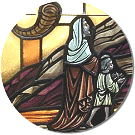
[ The following entry is related to this week's Torah reading, parashat Vayera. Please read the Torah portion to find your place here. ]
11.02.14 (Cheshvan 9, 5775) In last week's Torah (Lekh Lekha), we saw how the LORD spoke to Abram and invited him to forsake his ancestral home for the promise of God. In obedience to the call of the Word of the LORD, Abram left his homeland, his family, and his father's house to seek a better life - "for he was looking forward to the city that has foundations, whose architect and builder is God" (Heb. 11:10). But notice that it was only after Abram made the long journey into the unknown land of Canaan that God appeared to him saying, "To your offspring I will give this land" (Gen. 12:1-7). In other words, Abraham did not believe the promise because he saw God; but he was able to see God after he had walked in faith.... His faith in God enabled him to see God's hand, not the other way around. The principle of believing in order to understand is central to the walk of faith in this world.
Our Torah reading for this week (Vayera) includes what I call the "Gospel according to Moses," or rather Moses' account of how Abraham was tested by God to offer his "only begotten son" (בֵּן יָחִיד) as a sacrifice on Mount Moriah -- the place of the future Temple. This famous story is referred to as the Akedah (עֲקֵדָה), or Akedat Yitzchak (עֲקֵידָת יִצְחָק) - the "binding of Isaac" (Gen. 22:1-18). At the very last moment, the Angel of the LORD stopped Abraham from going through with the sacrifice and provided a ram as a substitute. Abraham then named the location Adonai-Yireh (יהוה יִרְאֶה), "the LORD will provide/see" (from the 3p impf. of the verb ra'ah (רָאָה), "to see"). The binding of Isaac perfectly illustrates both the principle of sacrificial love and the principle that we must first unreservedly believe in that love in order to understand the ways of the LORD.
As Messianic believers, we understand the Akedah as a foreshadowing of the ultimate sacrifice the heavenly Father would give on our behalf. Unlike Abraham, God the Father actually offered His only begotten Son (בֵּן יָחִיד) Yeshua upon Moriah in order to make salvation available to all who believe (John 3:16-18; 1 John 4:9). As Abraham himself believed: אֱלהִים יִרְאֶה־לּוֹ הַשֶּׂה / Elohim yireh-lo haseh ("God Himself will provide a lamb").
אֱלהִים יִרְאֶה־לּוֹ הַשֶּׂה לְעלָה בְּנִי
E·lo·him · yir·eh-lo · has·seh · le·o·lah · be·ni

"God will see for himself the lamb for the burnt offering -- my son."
(Gen. 22:8)

Indeed, the very first occurrence of the word love in the Scriptures (i.e., ahavah: אַהֲבָה) refers to Abraham's love for his "only" son who was to be sacrificed as a burnt offering on Moriah (the very place of the crucifixion of Yeshua), a clear reference to the gospel message (Gen. 22:2; John 3:16). Some scholars have noted that the word ahavah comes from a two-letter root (הב) with Aleph (א) as a modifier. The root means "to give" and the Aleph indicates agency: "I" give (i.e., the Father gives). Love is essentially an act of sacrificial giving... The quintessential passage of Scripture regarding love (αγαπη) in the life of a Christian is found 1 Corinthians 13: "Love seeks not its own..."
Whereas the Akedat Yitzchak foreshadowed God's provision for the coming Temple, the Akedat Yeshua (i.e., the crucifixion of Yeshua at Moriah) was the altar where the justice and chesed (love) of the Father fully met. For more on this incredibly rich subject, please see the articles, "The Passion of Isaac" and "The Sacrificed Seed."
|




















































